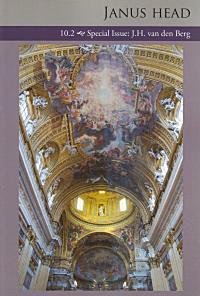 Janus Head Janus Head
10.2
Special Issue
J.H. van den Berg

Travels Inside the Archive
Robert Gibbons
Edge of Maine Editions

Beyond Time
New & Selected Work
1977 - 2007
Robert Gibbons
 The Age of Briggs & Stratton The Age of Briggs & Stratton
Peter Culley
|

photo - mw
_______________________
Why I Write
Tom Taylor
courtesy of jim leftwich, textimagepoem
We were going to take over the world, replace an obsolete discourse with one which was more efficient in its relation of conscious to unconscious, somehow more aligned: no thing but in seeing. But you forget along the way that the way is there at all, and so I wrote for all the reasons one could have, I made it my reason for existence, an esoteric, private activity which explained my moodiness and my inability to share myself with others in intimate relationships, be they colleagues or wives or my own children. I wrote from arrogant self-righteousness to blind, drunken (averted) rage, to the isolation of the secret masturbater. Isolated and you desperate for the company of others, so afraid to be alone in my “genius”, as it unfolded from calm intention through self loathing and sabotage to addiction and personality disorders and the absurd vow of poverty, those were part of the deal, and so I kept writing, day after day, page after page of black scratch on yellow paper. I courted chance, error and those compositional mistakes which the unconscious to penetrate through and into conscious mentation, like Gurdjieff’s monks chanting in such perfect union that the world itself ceases to exist at all.
I became aware of the disjunct and the profunct in my self.(....)
And one’s youthful fantasy that one could change (rule) the world effaced to just being there. Our last image of Peter Sellers is as he walks out of his last movie, becoming smaller and smaller as he walks out upon the water, into, what, just into.... So now I continue to write because I must continue putting one word down after another, and then another one, as a web of surprise continues to lead me across my time into whatever it is that is there to be discovered in this spasm which is continuing itself. Today is the tomorrow you were so worried about yesterday (A.A.). I go every weekend to my unfurnished house at the beach to think and dream and act and write and continue....(more)
_______________________
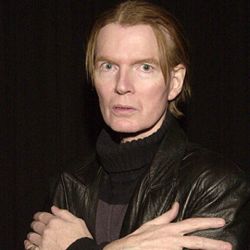 Jim Carroll
(August 1, 1950 - September 11, 2009)
Tom Clark remembers Jim Carroll
I have to reregister a room for my heart. It's been waiting a long time, somewhere outside, without so much as a whisper of protest. That abandonment wasn't just a abuse, it was a sin.
Today I went for a long walk with my dog, up to Mount Tamalpais. I watched a pumpkin spider for hours, weaving its web across a tri-pronged branch on a dead thorn bush. After watching all the insect death and escape, and the repairs that followed, I wanted to feel the web. It was nothing more than tactile curiosity. I reached out and fingered a piece, but I couldn't control my newly recovered senses. The fine tuning of my touch was off. I just couldn't gauge the resilience of the web. I was too caught up in the vibrance of the orange hump on the spider, and the silver intricacy of the weave. By the time I pulled my hand free, the whole web was torn apart. It seems the deeper I allow my perceptions to penetrate, the more ruin I leave in my wake.
I could vaguely fathom then that Jim was capable of a poet's pure wonder, the sort of thing I thought had gone out of poetry with Blake and Keats. Not until much later did I come to fully realize the quality of the poetic genius in whose presence I had been so fortunate to find myself, if only for isolated instants, as I padded along the cold asphalt in my two-dollar sneakers and he sauntered past with his stick and his little dog, giving me a wordless wink and a high sign, beneath the eucalypti, by the waters of the lagoon--all of it now drowned amid the tears of time....(more)
_______________________
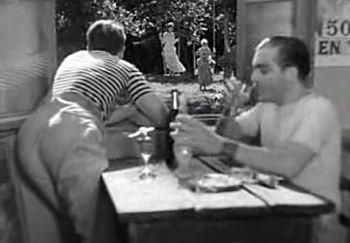
The swing
Une Partie de Campagne
Jean Renoir
1936
youtube
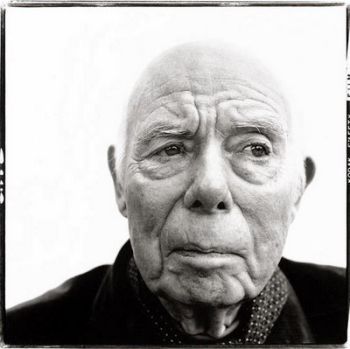
Jean Renoir
b. Sept.15 1894
photo - Avedon
“A director makes only one movie in his life. Then he breaks it into pieces and makes it again.”
- Jean Renoir
_______________________
The Idiotic Period
Justin E. H. Smith
So it’s simple: one remembers one's past life, not the life of an individual being, but a life diffused throughout nature, indistinct from nature, and way down, so to speak, at the bottom of the food chain. I also take it that this sort of memory is something that comes quite naturally to small children, and that is forgotten over time as our biographies begin to come together and make us feel like distinct substances. This is why children are by nature pananimists: they know something we’ve forgotten. We get big and dull-witted, we get real-estate licenses and landscapes become ‘land’, and we reimagine the recollection experienced in early childhood as mere learning, and even congratulate ourselves for teaching things to children they could not help but know.
It is the forgetfulness of that mode of experience that leads people to hope to sit around in heaven forever, more or less as they do here. Sometimes this is called a 'childish' view of the afterlife, though in fact it is anything but that. It is a resolutely adult theory, an idiotic theory, one that comes to be compelling only when one's existence comes to be wrapped up in post-zygotic autobiography, in all those stories one tells about oneself, stories that seem to depend on not coming back apart, on holding on to title, on not returning to the elements....(more)
_______________________
America
Claude McKay
Although she feeds me bread of bitterness,
And sinks into my throat her tiger's tooth,
Stealing my breath of life, I will confess
I love this cultured hell that tests my youth!
Her vigor flows like tides into my blood,
Giving me strength erect against her hate.
Her bigness sweeps my being like a flood.
Yet as a rebel fronts a king in state,
I stand within her walls with not a shred
Of terror, malice, not a word of jeer.
Darkly I gaze into the days ahead,
And see her might and granite wonders there,
Beneath the touch of Time's unerring hand,
Like priceless treasures sinking in the sand.
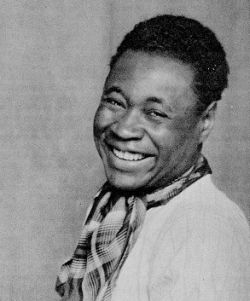
Claude McKay
September 15, 1889 – May 22, 1948
photo by Bernice Abbott c.1920
Harlem Shadows
The Poems of Claude McKay
Edited for the Web by Nelson Miller, 1999
Claude McKay: the literary identity from Jamaica to Harlem and beyond
By Kotti Sree Ramesh, Kandula Nirupa Rani
google books
"The loud music of life":
representations of jazz in the novels of Claude McKay
Paul de Barros
Antioch Review, Summer, 1999
"A chafing savage, down the decent street":
the politics of compromise in Claude McKay's protest sonnets
James R. Keller
African American Review, Fall, 1994
.....................................................
Birds of Prey
Claude McKay
Their shadow dims the sunshine of our day,
As they go lumbering across the sky,
Squawking in joy of feeling safe on high,
Beating their heavy wings of owlish gray.
They scare the singing birds of earth away
As, greed-impelled, they circle threateningly,
Watching the toilers with malignant eye,
From their exclusive haven--birds of prey.
They swoop down for the spoil in certain might,
And fasten in our bleeding flesh their claws.
They beat us to surrender weak with fright,
And tugging and tearing without let or pause,
They flap their hideous wings in grim delight,
And stuff our gory hearts into their maws.
_______________________
Requiem for a Union Town
How the Fight went out of Windsor
Christopher Shulgan
walrus
Windsorites didn’t define themselves by their jobs. That’s probably why I don’t think of cars when I think of Windsor; it’s certainly why my ex-girlfriend opted to settle for a factory job. Income calculated on what is now a base wage of $33 an hour, with health benefits and a guaranteed pension, allowed auto workers to concentrate on anything but their work. They defined themselves by their hobbies, whether it was photography or mountain biking. And they defined themselves by their familial responsibilities, their roles as fathers and mothers. Now that I have a family, I’ve come to understand that ours was a middle-class paradise, and that this paradise existed because of gains a radical and militant caw had won for its members over the years — gains that had trickled down, in turn, to eyeglass shop clerks, pizzeria owners, and members of the Windsor professional class (of whom my father was one). When auto sales were booming, when the overtime was rolling in, there wasn’t a better place in Canada to grow up....(more)
_______________________

Edmonds Lock
Rideau Canal
photo - mw
_______________________
Reflection On Gloss
Thomas Lowe Taylor
Word For/Word, Issue 6
In the surficial, silence reigns its usual head and shoulders above every other facet of indignation. Silents rain unusual beads and boulders among never mother faces of obligation. Your angry tools are featherd on the board in the garage where the bent wires poke from holes on the beadboard façade which is painted with little faces smiling sly intonations of doubt you'd imagined received and plotted from the hours remaining in your life to fill with some substances drawn from the so-called 'natural world' as it comes to you in dreams which are not.
The music from the other room covers the football sounds to my right and the confuser-hum at the tower in between. No cats live here any more. The garden has gone into winter's remission, leaning into the sporadic wind and rain from off the ocean further on the right hand side of the picture. We are in the middle of it all, smoothing the covers on the bed with right and left hands. The dog now has the chair all to herself, now that I am engaged here at the keyboard. At least there is location. Scan-dew. Fonterama from the skanking boo.
I'd seek no plento in the ark of shame; hear this lingo and slight the offers one dune at a time, with a sack of spuds containing two bombs, left at the airport without a shipping tag. It is that uncertain now, and a massive paranoia becomes the realer real in between moments of panic and superstition. Surely, an ignorance subscribes to the sense that everything is out of control, even in the sentence, even in the moving hand that writes and then moves on. Even as love makes you lonely. How'd your ship run aground?...(more)
_______________________
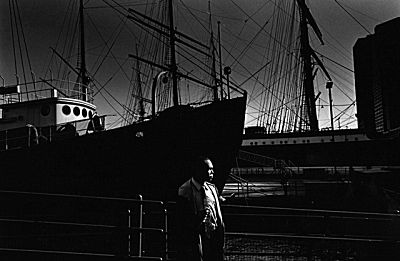
Drift
Aaron P. McElroy
_______________________
from
This Would Be Here
Thomas Lowe Taylor
scroll down
(....)Nor move beyond other times have swept your own signs along. This is the neon spasm, or furthered hours my own song. Here's my detail in your airs, go to later spires, but holding here is soon enough a name for you to call your own. I'd sorted things out, but not belonged exactly into the roomer calms; a softer skin is held by sign and line your own airs removed. But still, here is the newer life you called aside as yours, and met your own beloved in the shorter lights, these at the anchor hours.
*
What's not? The pleasured hours remain at still remiss--as you are forward or headed in, these specific shots are still one after the other, but not reminded at all, nor held nor moved. In the sailor hour, the sheeper spread reflects and holds aside. This is the nomenclature of what was said. The door. The other moon, but still holding in the less internal hours, your own anchor another room aside and floundered out, spun aside and fortuned or sailed away. A smooth surface resides here, and in other times, the also-ran holds his own reputation up for view, for vision, maybe. A lamer spoke, a floundered pier. Shots for one particular school or for a newer guise....(more)
.....................................................
This Today
Thomas Lowe Taylor
eratio poetic language issue six, fall 2005
scroll down
(....)Yet attainable in remarks and sentences there's no outer to the line it follows, in diagonal rooms the light lingers upward into the ceiling's motes and fathoms in reverse. The hour of what is spoke is on the docket for renewal, and the eloquent stranger finds the latest song inside the spaces left unmarked and unattended. Perhaps the signs will themselves be seen for what they are, remainders of the force that went ahead or aside or not at all. The hour on the wall is still indifferent to your claims. The marks which were intended for your measure have gone the same way into relevance and relief, and the sooner masks have blended out the basket on the wall with my heart in it. Even the sheetrock plenitude is unannounced, yet here within the hour and its manufacture there is some allowance for error which is pardoned, elicited forward into the realm of the undiscovered....(more)
_______________________
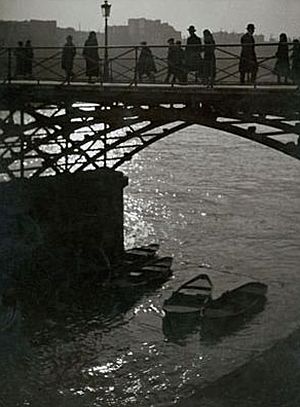
Pont des arts
Brassaï: Paris in the 30's
Edwynn Houk Gallery
via
_______________________
Google Book Search Bibliography
Version 5: 9/14/2009
Charles W. Bailey, Jr.
"This bibliography presents selected English-language articles and other works that are useful in understanding Google Book Search. It primarily focuses on the evolution of Google Book Search and the legal, library, and social issues associated with it. Where possible, links are provided to works that are freely available on the Internet, including e-prints in disciplinary archives and institutional repositories."
Digital Scholarshipvia ResourceShelf
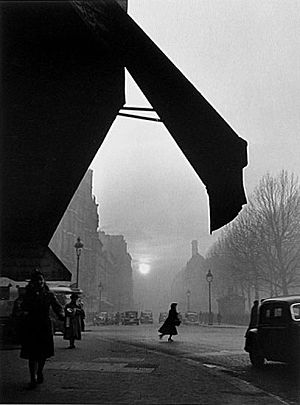
Carrefour Sèvres-Babylone
Paris
Willy Ronis
1948
.....................................................
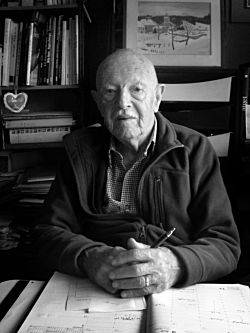
Willy Ronis
(August 14, 1910 - September 12, 2009)
heads up from Jim Johnson
1 2 3 4 5
.....................................................
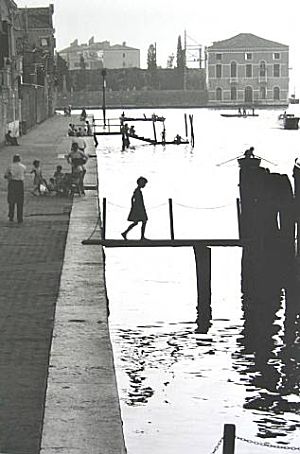
Fondamente Nuove
Venice
Willy Ronis
1959
_______________________
Learning from de Man - Looking Back
Gayatri Chakravorty Spivak
aaaarg
Careful staging can be read as a persistent caution against the vanguardism of theory from some practitioners of theory. This is also contained within de Man’s aphorism ‘‘Nothing can overcome the resistance to theory since theory is itself this resistance.’’ Nothing is more dangerous than theory seen as purely applicable. ‘‘Cultural revolutions’’ hang in there.
.....................................................
Resistance That Cannot Be Recognized as Such
Gayatri Chakravorty Spivak interviewed by Suzana Milevska
Journal for Politics, Gender and Culture, Vol. II, No. 2, Winter 2003
aaaarg
S. M.:
Can you try to answer why identifying with the position of "subaltern" is so seductive but the profound attempt to hear and understand is not? Or more precisely, why the academics and intellectuals from various marginalised cultural backgrounds so easily identify with the subaltern although coming from the most elitist classes of academics and other technocratic, cultural or ethnic power positions? Is there a kind of cry for compassion hidden behind such aspiration, a kind of deliberation in taking the position of victim, or wanting to become it.s ventriloquist claiming that it cannot speak, instead of admitting that there is nobody to hear?
G. S.: Well, you have answered the question yourself....(more) _______________________
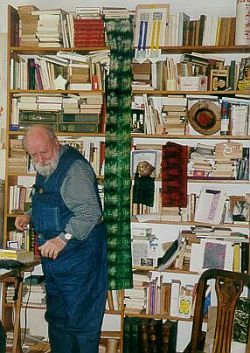
Michel Butor
b. Sept. 14, 1926
An efficient work of literature will close some bad periods, but that closing is not permanent. Even during unproductive cultural epochs, something can be redeemed. We have never closed the Dark Ages. Our own age is still dark and we hear voices rising out of it. We have to change our past in order to change our future. We must turn back and throw light on it to see it in a new way. What we need is archeology around and in ourselves.
-
- An Interview with Michel Butor
Frontiers
Michel Butor translated by Elinor S. Miller google books
Portrait of the artist as a young ape: a caprice
Michel Butor
translated by Dominic Di Bernardi
google books .....................................................
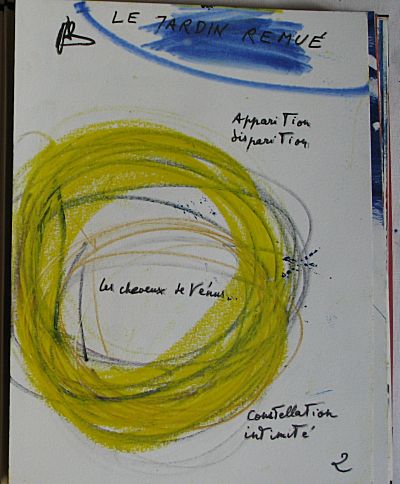
Chants de la gravitation
Michel Butor - Georges Badin
.....................................................
from
REPAIR / MICHEL BUTOR
translated by Michael Benedikt
14
along shores covered with dark green trees
resection white cauterization
I was rowing
I sleep
I wasn't alone
y c kneecap
in a flimsy canoe
wound
and we glided in tranquility upon the waters
a drop of honey grey cicatrization
while frightening the wild ducks and otters
I sail on
amid fragrances of pine-needles
perforation d femur
and there was in the sky a star named the sun
rip
which descended very gently among the peaks
x violet rotation
and amid the reeds onto the sand
I swim
some lively lizards and gentle turtles too
a drop of oil e sternum
slight
soldering
a little
innoculation indigo ventilation
just a little more
I'm dropping
off a little more still
w
...(more)
in
Aspen no. 5+6
The Minimalism issue
Fall-Winter 1967
Narrative apostrophe: reading, rhetoric, resistance in Michel Butor's 'La modification' and Julio Cortazar's "Graffiti."
Irene Kacandes Style, Fall, 1994
_______________________

photo - mw
_______________________
I've written here before about whether or not the world has already ended and we are just caught in the wake and disintegration of its memory. Seeing previews for so many of the horror films about to be released, as well as the harsh ugliness of District 9 and Zombieland, not to mention the upcoming The Road and 2012, it seems as if the culture itself is now realizing the end, the end not just in itself but for itself. It's like our whole world looks like Southland Tales, like we've become a kind of screen of violence and filth.
The awfulness of the summer, with the ludicrous town halls and open displays of brown shirted thuggery, as well as the mindfuck of the birthers and anything that erupts out of Sarah Palin's and Glenn Beck's gaping maws, reached a new level with the total contempt for the President, Congress, and political process demonstrated by House Republicans this last week. It all gives me the same feeling as the poor professor debased in a crowing bird costume at the end of the Marlene Dietrich film, The Blue Angel. The overall feeling of decay, decadence, collapse is overwhelming.
- Jodi Dean, Drift away
_______________________
ALPINE
George Oppen
We were hiding
Somewhere in the Alps
In a barn among animals. We knew
Our daughter should not know
We were there. It was cold
Was the point of the dream
And the snow was falling
Which must be an old dream of families
Dispersing into adulthood
And the will cowers
In the given
The outlaw winds
That move within barns
Intolerable breeze
A public music
Seeps thru the legendary walls
The cracked inner sides
The distinctions of what one does
And what is done to him blurrs [sic]
Bodies dream selves
For themselves
From the substance
Of the cold
Yet we move
Are moving
Are we not
Do we hear the heaving moving
Of the past in barns
The Textual Dilemma of Oppen's Alpine
Brad N. Haas
flashpoint
.....................................................
All This Strangeness: A Garland For George Oppen
Edited by Eric Hoffman
big bridge
_______________________
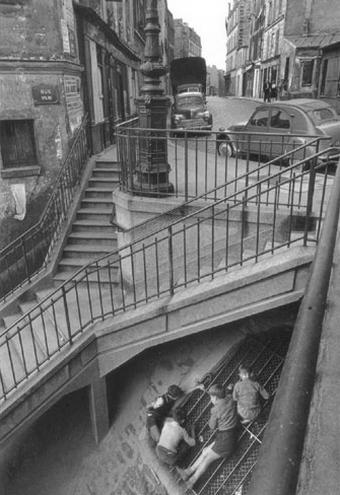
Belleville
Willy Ronis
1959
_______________________
For the Time Being
Norman Fischer
Life is a challenge and in the welter of it all it is easy to forget who you are. Decades go by. Finally something happens. Or maybe nothing does. But one day you notice that you are suddenly lost, miles away from home, with no sense of direction. And you don’t know what to do.(....)
... I find it impressive how thoroughly normal it is be so tentative about the time of our lives, or so asleep within it, that we miss it entirely. Most of us don’t know what it actually feels like to be alive. We know about our problems, our desires, our goals and accomplishments, but we don’t know much about our lives. It generally takes a huge event, the equivalent or a birth or a death, to wake up our sense of living this moment we are given – this moment that is just for the time being, because it passes even as it arrives. Meditation is feeling the feeling of being alive for the time being. Life is more poignant than we know....(more)
via tasting rhubarb
 Black Door
Bill Arnold: Itek Prints
Joseph Bellows Gallery
via
_______________________
from
Draft 98: Canzone
Rachel Blau DuPlessis
jacket
(....)
Reject the whole that someone claims is rule.
A hole, a line, a hold, a lie, a hope,
a hype will slide you through this most dangerous spot.
Resist only rectitudes, resist the crazed
and driven knowers. Find and replace.
Though the mechanism to depict this is
called documentary, still it needs the stinging
pulse of lines. This matches that.
All “ofness” exists
for much more Of.
The beyond moves to two places: here and there.
To achieve connection,
is there just one route of passage?
There is not.
...(more)
_______________________

Mondrian Worker
Saul Leiter
1954
1 2
_______________________
Info-Labour and Precarisation
Franco Berardi Bifo
Translated by Erik Empson
republicart
The informatic procedures of the recombination of semiotic material have the effect of liquifying the 'objective' time necesssary to produce the info-commodity. All the time of life the human machines is there, pulsating and available, like a brain-sprawl in waiting. The extension of time is meticuously cellularised: cells of productive time can be mobilised in punctual, casual and fragmentary forms. The recombination of these fragments is automatically realised in the network. The mobile phone is the tool that makes possible the connection between the needs of semio-capital and the mobilisation of the living labour of cyber-space. The ringtone of the mobile phone calls the workers to reconnect their abstract time to the reticular flux.
It's a strange word that with which we identify the ideology prevalent in the posthuman transition to digital slavery: liberalism. Liberty is its foundational myth, but the liberty of whom? The liberty of capital, certainly. Capital must be absolutely free to expand in every corner of the world to find the fragment of human time available to be exploitated for the most miserable wage. But liberalism also predicates the liberty of the person. The juridical person is free to express itself, to choose its representatives, to be entrepreneurial at the level of politics and the economy.
Very interesting, only that the person has disappeared...(....)
... class and its systemic de-personalisation, the slavery that is affirmed as a mode of command of precarious and de-personalised work? This is the question that is posed with insistence by whoever still has a sense of human dignity. Nevertheless the answer does not come out because the form of resistance and of struggle that were efficacious in the C20th appear to no longer have the capacity to spread and consolidate themselves, nor consequently can they stop the absolutism of capital. An experience that derives from worker’s struggle in the last years, is that the struggle of precarious workers does not make a cycle. Fractalised work can also punctually rebel, but this does not set into motion any wave of struggle. The reason is easy to understand. In order for struggles to form a cycle there must be a spatial proximity of the bodies of labour and an existential temporal continuity. Without this proximity and this continuity, we lack the conditions for the cellularised bodies to become community. No wave can be created, because the workers do not share their existence in time, and behaviours can only become a wave when there is a continuous proximity in time that info-labour no longer allows....(more)
_______________________

American Dreams Book
Robert Indiana
b. Sept. 13, 1928
_______________________
Toward a Theory of Phantasmal Media:
An Imaginative Cognition- and Computation-Based Approach to Digital Media
D. Fox Harrell
From its very beginnings, psychoanalysis has been concerned with the material of fantasies/phantasms (fantasmes). "Fantasy," in German "Phantasie," is the term used to denote the imagination, not so much the faculty of imagining (the philosophers' Einbildungskraft) as the imaginary world and its contents, the imaginings or fantasies/phantasms into which the poet or the neurotic so willingly withdraws.
Now influential in literary theory rather than viewed as grounded scientific knowledge, the phantasm is a useful concept for describing a powerfully expressive type of computational media. In such work, taken up later by philosophers such as Gilles Deleuze in, the phantasm often seems to oppress and confine rather than to empower. Indeed, our senses of identity, community, values, which often become quite divisive, arise from the phantasmal. Yet, constructing learning to recognize phantasms and to create new and empowering ones, what Otto Santa Ana calls "insurgent metaphors," can help us to design media with empowering and critically aware aims. Phantasmal media need not only indoctrinate with hegemonic values, but also can construct a play of ideas in order to question or even change social order for the better.
Computational media can construct ideas that we unconsciously accept as true and constitutive of reality, yet in fact these are imaginatively grounded cultural constructions. ...(more)
_______________________

Maunsell Army Sea Forts via BLDGBLOG
_______________________
The Office for Soft Architecture
Seventh Walk
Lisa Robertson
Drunken Boat
We had been at our physical exercises. Now we entered into the late civic afternoon. The scissoring metres of the apparatus had left us lucid, distant, and extreme. Cool air parsed our acuity. Although we indeed sauntered in the street, through the grey discourse called human and concatenations of rain (in short, in the mode of the ordinary), my guide and I perceived as from a vast temporal distance an impertinently muttering tide of ambitions and ticks. It was our city. We recognized the frayed connective cables sketched by words like ‘went’ and ‘pass,’ the sacral nostalgias fueling violence and the desiring apparatus of love. Utopia was what punctuated the hum of disparities. Utopia; a searing, futuristic retinal trope that oddly offered an intelligibility to the present. We saw that we could lift it and use it like a lens. We observed guys in their cities, guys in their cities and their deaths and their little deaths and mostly what we coveted was their sartorial reserve, so marvelously useful for our purpose. “The fact remains that we are foreigners on the inside” opined my guide; “but there is no outside.” And it was true that inside any “now” there was the syllable by syllable invention and the necessity for the disappearance of faces and names. Therefore we wanted only to document the present. For example, women—what were they? Arrows or luncheons, a defenestration, a burning frame, the great stiff coat with its glossy folds, limbs, inner Spains. . . Our hands forgot nothing. We searched for these pure positions to frame with our lens. Our foreignness was a precisely burdensome gift.
Make no mistake. Here I am narrating an abstraction. When I say “our lens” I do not intend to indicate that, like the master Atget, we hauled a cumbersome and fragile equipment across neighbourhoods....(more)
_______________________
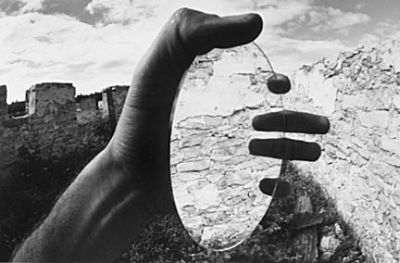 Door County, Wisconsin
Joseph D. Jachna
1970 1 2 _______________________
'I speak like a ten-year old with strange jargon attached to it' [pdf]
An interview with Jodi Dean
Krisis
First, I would like to ask you about a recent development in your work, your interest in (Lacanian) psychoanalysis? How and when did that come about?
JD: I have got two kinds of semi-competing, semi-overlapping trajectories, or reasons: a Habermasian and a Lacanian approach to communication; the Lacanian approach is like an X-ray vision on, or the negative of a Habermasian approach. Both are ways to think about politics – and ethics – that begin with language. The Habermas side has a cognitive approach to language, whereas the Lacanian side emphasizes the irrational elements of language. So one is rooted in understanding and the other in the inevi-tability and productivity of perpetual misunderstanding. It’s almost as if you follow Habermas all the way through – the more you think about language and how it always ultimately fails and misfires and has these points of enjoyment and attachment in it – you end up in this wonderful Möbius-strip that turns you into a Lacanian.
(....)
Can we say that the appeal of the Lacanian framework for us is in a way due to the Balkan crisis, by the fragmentation it exhibits?
In For they know not what they do (1991), Žižek poses the problem in terms of a trick: we were promised liberal democracy but we got capital-ism and nationalistic violence instead. The Western fascination with the changes that took place in 1989 was part of the infatuation with the idea that there were other people who admired our democracy. But then it twists and it becomes this nightmare of capitalism and nationalism. We now recognize the real impact of the loss of the soviet ideal: that the kind of ideals that might have been present when we could see them reflected through their absence, in our fantasy version of the Soviet Union, are realized in this horrifying version of ethnic and fundamentalist hatred and violence and forms of extreme neo-liberal capital financialization and violence.
Speaking more from the perspective of social philosophy, what also seems to have got lost in this fragmentation is the idea of civil society. In the early nineties we had to ask ourselves: is there anything ‘left’ of civil society?
JD: I think this is exactly the problem. I think there is nothing Left now in civil society. Civil society is primarily a (neo-)liberal space. Foucault’s Birth of biopolitics is really wonderful in this regard. Civil society emerges as this site of aspiration, once leftists have given up on the state, and on state control of the economy, completely. There are always civil society organizations that are capable of helping people live wonderful lives and securing certain identities. Civil society can function as a stage where there can be struggles for inclusion and recognition and participation, and all those good things. But what is interesting is that civil society becomes key at the moment this so-called disciplinary society is actually withering away. So we don’t have subjects in civil society capable of being civil soci-ety actors! It’s just like how Habermas announces and laments the public sphere at the moment of its loss. Similarly, heirs of Habermas, civil society theorists like Jean Cohen and Andrew Arato in Civil society and political theory (1992), a fabulous book by the way, are emphasizing the role of civil society exactly at the moment it is disintegrating. But this is maybe the perpetual problem of political philosophy in general; we are always look-ing back as we go forward.
Krisis: Journal for contemporary philosophy
Jodi blogs at I cite

Café de Kartal
1956
Lost Istanbul:
1950s and 60s
Ara Güler
Lens Culture
1 2 3
Interview with Ara Güler
2002
_______________________
Raymond Roussel’s Self Help Notes
(A Commentary On Bob Perelman’s “Chronic Meanings”)
Alan Ramón Clinton
Glossator
The words in bold represent the lines of Perelman's poem, in order, which in the original all begin with capital letters and end in periods.
If I could at least find some meaning for my chronic symptoms, even if I can’t cure them. Reducing them all to the single fact is matter1 for fantasy, but I would settle for a thread of some kind. Already people are coming to me, unsolicited, and asking advice on interface. But, it’s like I’m sending telegrams to myself, and five words can say only so much. Ordinary things like black sky at night, reasonably integrated into the logic of cause and affect, have the power to fill me with an utter sense of dread. No matter what I say I am, the irrational residue of what I’m not haunts me more than anything.
When I was a kid, my friends and I stumbled on a blown up chain link fence. We knew at the time it wasn’t really blown up, but we began to believe our own lie and the thought that it might really have been blown up returned next morning stronger than ever. And by midnight the pain is almost palpable, we think that we’re the chain link fence in the act of being blown up. The train seems practically expressive as it goes by, mocking us.
It’s a story familiar as a story can be. Society has broken into bands the nineteenth century was sure would end up burning characters in the withering capital.
.....................................................
Nous ne faisons que nous entregloser
-
Montaigne
All our so-called consciousness is a more or less fantastic commentary on an unknown, perhaps unknowable, but felt text
-
Nietzsche
Not system but commentary is the legitmate form through which truth is approached
-
Gershom Scholem
GlossatorVol 1 (2009) Open Journal Systems
Glossator publishes original commentaries, editions and translations of commentaries, and essays and articles relating to the theory and history of commentary, glossing, and marginalia (catena, commentum, gemara, glossa, hypomnema, midrash, peser, pingdian, scholia, tafsir, talkhis, tika, vritti, zend, zhangju, et al). The journal aims to encourage the practice of commentary as a creative form of intellectual work and to provide a forum for dialogue and reflection on the past, present, and future of this ancient genre of writing. By aligning itself, not with any particular discipline, but with a particular mode of production, Glossator gives expression to the fact that praxis founds theory.
Benjamin At The Barricades: The Arcades Project As Combat And Intrigue
Erik Butler
Periphery And Purpose:
The Fifteenth-Century Rubrication Of The Pilgrimage Of Human Life
Stephanie A. Viereck Gibbs Kamath
via Richard L. W. Clarke at Philosophy's Other: Theory On The Web
_______________________
Speaking and Seeing in Raymond Roussel
Michel Foucault
from Aesthetic, Method, and Epistemology
AAAARG
free reg. req.
AAAARG is a conversation platform - at different times it performs as a school, or a reading group, or a journal.
AAAARG was created with the intention of developing critical discourse outside of an institutional framework. But rather than thinking of it like a new building, imagine scaffolding that attaches onto existing buildings and creates new architectures between them. This is quite a remarkable resource - mw
"Awaiting Oblivion"
Maurice Blanchot
translated by John Gregg
"When The Time Comes"
Maurice Blanchot
translated by Lydia Davis
"Love and Community: A round-table discussion with Jean-Luc Nancy, Avital Ronell and Wolfgang Schirmacher"
European Graduate School Media and Communications Division
_______________________

Ara Güler
_______________________
from
Chronic Meanings
Bob Perleman
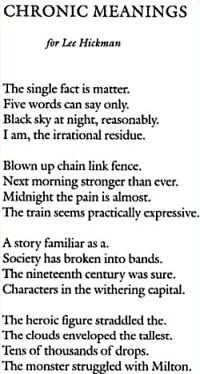
...(more)
Ten to one: selected poems
Bob Perelman
google books
_______________________

On Galata Bridge
Ara Güler
1956
_______________________
Sailing
Times are getting unsafe:
no one watching
by the rudder in coal-black
nights no one
knowing
where to steer
the days
unknown depth
screaming proximity
- in the ship
full of fear.
.....................................................
Poems From Island
Ingibjörg Haraldsdóttir
translated by Dávid Kunszenti-Kovács
European Cultural Review .....................................................
While The Town Is Asleep
While the town is asleep
rises from the sea the land
with high peaks
it rises from the grey water
white and blue and green
to kiss the red sun
I take my hands
to yours my white land
but then the town wakes
and my homeland sinks slowly
in the grey water.
_______________________

Shock & Awe
Chlorophyll print and resin
Immortality:
The Remnants of the Vietnam and American War
Binh Danh
artist statement
In my work, photosynthesis is used to record images onto leaves using only chlorophyll and light: the life source of plants and, consequently the Earth. The leaves are then cast in resin, like biological samples for scientific studies.
This process deals with the idea of elemental transmigration: the decomposition and composition of matter into other forms. The images of war are part of the leaves, and live inside and outside of them. The leaves express the continuum of war. They contain the residue of the Vietnam War: bombs, blood, sweat, tears, and metals. The dead have been incorporated into the landscape of Vietnam during the cycles of birth, life, and death; through the recycling and transformation of materials, and the creation of new materials. As matter is neither created nor destroyed, but only transformed, the remnants of the Vietnam and American War live on forever in the Vietnamese landscape.

Ambush in the Leaf
Binh Danh
2007
_______________________
A People's History Of The United States
Howard Zinn
full text
Presented by History Is A Weapon
via Thivai Abhor
_______________________
Affinities: A Journal of Radical Theory, Culture, and Action
_______________________
Deserting the Culture Bunker
John Jordan
We have to stop pretending that the popularity of politically engaged art within the museums, magazines and markets over the last few years has anything to do with really changing the world. We have to stop pretending that taking risks in the space of art, pushing boundaries of form, and disobeying the conventions of culture, making art about politics makes any difference. We have to stop pretending that art is a free space, autonomous from webs of capital and power.
It’s time for the artist to become invisible. To dissolve back into life....(more)
The Journal of Aesthetics and ProtestConceptual Framework of Direnal-Istanbul Resistance Days
Resistanbul Commissariat of Culture
The curators wonder whether Brecht’s question ‘What Keeps Mankind Alive’ is equally urgent today for us living under the neoliberal hegemony. We add the question: ‘What Keeps Mankind Not-Alive?’
_______________________
Speculative Activism
traxus442
American Stranger
That our very existences on social networking sites are commodities is an often overlooked fact. Given an existence wholly circumscribed by a virtual marketplace, everything we do, everything we post, is potentially a commodity by virtue of its link to ‘us.’ In ‘viral activism,’ by reproducing a more or less homogeneous message (a ‘meme,’ one of the few instances where the word actually refers to something), a population makes itself available as a single commodity for use by others in exchange for individual use of the same message as a ’status update’: an advertisement that promotes a certain identity to their ‘friends’ (and to themselves). The only difference between this and any other Facebook content is that this ‘mega-meme’ is produced ‘from the ground up.’
These are not simply semantic distinctions — they have consequences. ...(more)
_______________________
Knowledge's Redemption
Michel Serres
free reg. req.
Published as the feature 'Superhighways for All' in 'Revue Quart Monde'
(1), Paris (No 163, March 1997)
Ask yourself, what is the book you pobably would find at the home of people without much money to spend? It is a dictionnary, a small Webster. Is this a book that teaches you maths, or history, or economy? Not really. It is a book where the chief enjoyment consists browsing through it, 'surfing' the mass of data provided. Internet is nothing but a massive dictionnary, a gigantic space in which the body travels.
Intelligence is not about knowing axiomatically how to reason... The French 16th Century philosopher Montaigne already had dismissed the concept of a 'well-stuffed head'.(....)
Mankind is going to wander in the mass of information just as you are now wandering in the woods and the mountains exploring the real world. Up to the present time, knowledge was a space where you would be taught how to reason, and where you had to memorize a lot. Now it is going to be a space to roam about. That has never happened before. _______________________

Corte Madera
Where She Lived
George LeChat
hiding in plain sight
George is also a contributor to
Bay Area Art Quake
_______________________
A Tribute to David Bromige, KRCB-FM, 2009
audio - 1 hour
Penn Sound
_______________________
A Mighty Small Mag: The Malahat Review
profiled at The Literary Type - The Literary Type
You Can Help Save Small Mags
The Literary Type
The Malahat Review
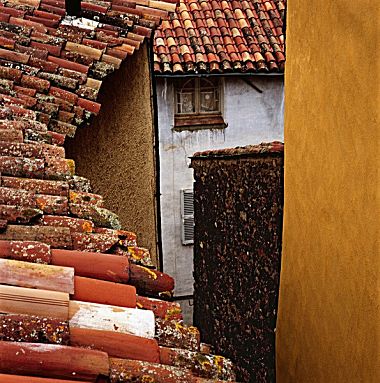
Le Var VII
Giles Rafsnider
PhotoBistro
_______________________
Smokers of Paper
Cesare Pavese
Translated by Geoffrey Brock
He’s brought me to bear his band. He sits in a corner
mouthing his clarinet. A hellish racket begins.
Outside, through flashes of lightening, wind gusts
and rain whips, knocking the lights out
every five minutes. In the dark, their faces
give it their all, contorted, as they play a dance tune
from memory. Full of energy, my poor friend
anchors them all from behind. His clarinet writhes,
breaks through the din, passes beyond it, releasing
like a lone soul, into a dry, rough silence.
The poor pieces of brass have been dented too often:
the hands working the stops also work in the fields,
and the obstinate brows stay fixed on the ground.
Miserable worn-out blood, weakened
by too many labors—you can hear it groan
in their notes, as my friend struggles to lead them,
his own hands hardened from swinging a hammer,
from pushing a plane, from scraping a living.
He’s lost all his old comrades, and he’s only thirty.
Part of the postwar group that grew up on hunger.
They all came to Turin, to look for a life,
and discovered injustice. He learned, without smiling,
how to work in a factory. He learned how to measure
the hunger of others with his own fatigue—
injustice was everywhere. He tried to find peace
by walking, at night, down streets without ends,
half-asleep, but found only thousands of streetlamps
blazing down on iniquity: hoarse women and drunks,
staggering puppets, far from their homes, He came,
one winter, to Turin—factory lights, smoke and ash—
and he learned what work is. He accepted that work
was part of a man’s hard fate; if all men did that,
there just might be some justice in this world.
And he found new comrades. He suffered their long words,
he listened and waited for them to be over.
He made them his comrades. Families of them
in each house, the city surrounded by them, the face
of the world covered with them. And each of them
felt desperate enough to conquer the world.
They sound harsh tonight, despite all the time
he spent coaching each player. He ignores the loud rain
and the flickering lights. His face is severe,
fixed on some grief, almost biting the mouthpiece.
I’ve seen this expression before, one evening, just us
and his brother, who’s ten years sadder than him.
We were up late in the dim light, the brother studying
a lathe he had built that didn’t work right,
and my poor friend cursing the fate that kept him there,
bound to his hammer and plane, feeding a pair
of old people he never asked for.
That’s when he yelled
that it wasn’t fate that made the world suffer
or made the daylight spark blasphemous outbursts:
man is the guilty one. If we only could just leave,
and be hungry and free, and say no
to a life that uses our love and our piety,
our families, our patches of dirt, to shackle our hands.

Cesare Pavese
b. Sept. 9, 1908
Cesare Pavese translated by Linh Dinh
milkmag
Of sea and words and toil: the poetry of Cesare Pavese
Olivier Burckhardt
Quadrant, July-August, 2004
.....................................................
Ancestors
Cesare Pavese
Translated by Geoffrey Brock
Stunned by the world, I reached an age
when I threw punches at air and cried to myself.
Listening to the speech of women and men,
not knowing how to respond, it's not fun.
But this too has passed: I'm not alone anymore,
and if I still don't know how to respond,
I don't need to. Finding myself, I found company.
...(more)
.....................................................
Reading Cesare Pavese
John Taylor
Context
"Non scriverò piú." With these solemn words, which mean "I will not write anymore," the Italian novelist, short-story writer, and poet Cesare Pavese (1908-1950) concluded his diary, and killed himself nine days later by taking an overdose of sleeping pills.
Of what is a writer's suicide emblematic? Of writing's inability to save a life? Ardent lovers of literature may even find it hard to believe that a talent like Pavese's could not somehow have kept on producing, plunging anew into the toils of composition as a way of resolving perfunctorily (or at least of putting off) the comparatively minor problems of unrequited love and daily living. But of course I am waxing ironic. It is arresting and, I daresay, grimly informative that Pavese's extraordinarily lucid and pessimistic diary is entitled Il mestiere di vivere (1952), a book translated into English as This Business of Living and all too significantly emphasizing the "métier" or "trade" of living--as in, say, "Mastering the Trade of Living."...(more)
_______________________

Railway bridge at Argenteuil
[Paris - 1871]
Adolphe Braun
_______________________
German Orientalism and the Decline of the West [pdf]
Suzanne Marchand
Proceedings of the American Philosophical Society, Vol. 145, No. 4 (Dec., 2001)
This essay offers an overview of some of my new work on German cultural engagement with “the Orient,” a region that, for nineteenth-century Europeans, embraced the territory from eastern Vienna to the Bering Straits. This is a project shaped in response to Edward Said’s path-breaking 1978 book Orientalism , but one that departs quite radically from his methods and assumptions. I designed the project, in part, to test his claim that colonial power relations permeate modern studies of the Orient; Said’s omission of the Germans has often been noted, with either regret or malicious delight, for they were indisputably the most important orientalist scholars between about 1830 and 1930, despite having virtually no colonies in the East. But as I dug deeper into the world of professional Orientalistik , and popular “orientalism,” I realized that an exclusive concentration on the impact of colonialism risks reducing a highly interesting cultural phenomenon to banality.
Thus what I want to do in this paper is to sketch a number of other cultural factors that shaped German “orientalism,” and to show that though colonizing aspirations did indeed play a role, the new popularity and political valence it gave to oriental studies did not function exclusively to perpetuate Eurocentric views. On the contrary, it is my contention that, though focused on the languages of the ancient world, German orientalism helped to destroy Western self-satisfaction, and to provoke a momentous change in the culture of the West: the relinquishing of Christianity and classical antiquity as universal norms.
thanks to languagehat
_______________________

Still Life of a Hunting Scene
Adolphe Braun
1860
Carbon print
Adolphe Braun, another book review
Mrs. Deane
_______________________
Living in a Culture of Cruelty: Democracy as Spectacle
Henry A. Giroux
Under the Bush administration, a seeping, sometimes galloping, authoritarianism began to reach into every vestige of the culture, giving free rein to those anti-democratic forces in which religious, market, military and political fundamentalism thrived, casting an ominous shadow over the fate of United States democracy. During the Bush-Cheney regime, power became an instrument of retribution and punishment was connected to and fueled by a repressive state. A bullying rhetoric of war, a ruthless consolidation of economic forces, and an all-embracing free-market apparatus and media driven pedagogy of fear supported and sustained a distinct culture of cruelty and inequality in the United States. In pointing to a culture of cruelty, I am not employing a form of left moralism that collapses matters of power and politics into the discourse of character. On the contrary, I think the notion of a culture of cruelty is useful in thinking through the convergence of everyday life and politics, of considering material relations of power - the disciplining of the body as an object of control - on the one hand, and the production of cultural meaning, especially the co-optation of popular culture to sanction official violence, on the other. The culture of cruelty is important for thinking through how life and death now converge in ways that fundamentally transform how we understand and imagine politics in the current historical moment - a moment when the most vital of safety nets, health care reform, is being undermined by right-wing ideologues. What is it about a culture of cruelty that provides the conditions for many Americans to believe that government is the enemy of health care reform and health care reform should be turned over to corporate and market-driven interests, further depriving millions of an essential right? ...(more)
_______________________

Utah Phillips
The “Golden Voice of the Great Southwest”
Legendary Folk Musician, Activist Utah Phillips
1935-2008
_______________________
"We're The Children Of Barnum & Bailey"
Bill Moyers
Those crackpots on the right praying for Obama to die and be sent to hell - they're the warp and woof of home-grown nuttiness. So is the creature from the Second Amendment who showed up at the President's rally armed to the teeth. He's certainly one of us. Red, white, and blue kooks are as American as apple pie and conspiracy theories. (....)
So here we are, wallowing in our dysfunction. Governed — if you listen to the rabble rousers — by a black nationalist from Kenya smuggled into the United States to kill Sarah Palin's baby. And yes, I could almost buy their belief that Saddam Hussein had weapons of mass destruction, only I think he shipped them to Washington, where they've been recycled as lobbyists and trained in the alchemy of money laundering, which turns an old-fashioned bribe into a First Amendment right.
Only in a fantasy capital like Washington could Sunday morning talk shows become the high church of conventional wisdom, with partisan shills treated as holy men whose gospel of prosperity always seems to boil down to lower taxes for the rich.
Poor Obama. He came to town preaching the religion of nice. But every time he bows politely, the harder the Republicans kick him.
No one's ever conquered Washington politics by constantly saying "pretty please" to the guys trying to cut your throat.
Let's get on with it, Mr. President. We're up the proverbial creek with spaghetti as our paddle. This health care thing could have been the crossing of the Delaware, the turning point in the next American Revolution — the moment we put the mercenaries to rout, as General Washington did the Hessians at Trenton. We could have stamped our victory "Made in the USA." We could have said to the world, "Look what we did!" And we could have turned to each other and said, "Thank you."
As it is, we're about to get health care reform that measures human beings only in corporate terms of a cost-benefit analysis. I mean this is topsy-turvy — we should be treating health as a condition, not a commodity. ...(more)
_______________________

Paul Goodman
b. Sept. 9, 1911
The Radical Individualism of Paul Goodman
Richard Wall
Paul Goodman at the Carnival of Anarchy
Eugene Plawiuk
_______________________
Strange Bird
Douglas Messerli
reviewing Brad Gooch, Flannery: A Life of Flannery O'Connor
EXPLORINGfictions
_______________________
Press Forward: Dialogues on the Future of News
A new series from CJR
colubia journalism review
Common Knowledge
Communal news in a fragmented world
Megan Garber
cjr
_______________________

Le Thoronet I
Giles Rafsnider
_______________________
Essay on and interview with Manuel deLanda
Paul D. Miller a.k.a Dj Spooky that Subliminal Kid
Beginning, middle, and end - all were signposts within a latticework of actions and deeds, all took place within the oral tradition of a culture where things were hybrid, and created to keep a register of the dramas of the past. It wasn't until the rise of different historical methods that Herodotus was "formalized" and ossified. This is where Manuel Delanda's work becomes extremely relevant - it shows us how to look outside the frame. .....
MD:
I agree that the domination of this century by linguistics and semiotics (which is what allows us to reduce everything to talk of "frameworks of interpretation"), not to mention the post-colonial guilt of so many white intellectuals which forces them to give equal weight to any other culture's belief system, has had a very damaging effect, even on art. Today I see art students trained by guilt-driven semioticians or post-modern theorists, afraid of the materiality of their medium, whether painting, music, poetry or virtual reality (since, given the framework dogma, every culture creates its own reality). The key to break away from this is to cut language down to size, to give it the importance it deserves as a communications medium, but to stop worshipping it as the ultimate reality. Equally important is to adopt a hacker attitude towards all forms of knowledge: not only to learn UNIX or Windows NT to hack this or that computer system, but to learn economics, sociology, physics, biology to hack reality itself. It is precisely the "can do" mentality of the hacker, naive as it may sometimes be, that we need to nurture everywhere. ...(more)
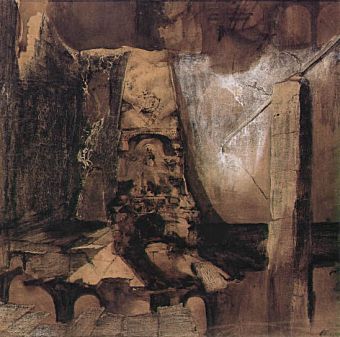
"Hic clavis, alias porta"
(The key is here, the gate elsewhere)
Victor Hugo
1871
Art of Victor Hugo: an overview of his drawings
_______________________
The chosen one
Ángel Escobar
Translated by Kristin Dykstra
Above this stone is my head.
And above my head is the moon.
That knowledge makes no one feel better.
Much less the knowledge that above the moon
there are another head and another stone.
And that the sum of acts and words
I’ve performed may end here.
In another head, another stone and another moon,
which are neither close nor far
which we once would mention in apathy and vanity.
This does not divide me from my destiny:
The day, the night, the animal and the line.
Moreover, what curve infinitude exists where
the head is the stone and the stone
is the moon. Moons, heads, stones
are not consecutive sets. Or
the facets of my face in the lake.
I know: only the crackles in which I burn follow upon each other.
I know: only my discourse is given to the spectacle.
(....)
All comes to an end. Oh, no. Ah, pyramid. Ah, moon.
The spiral goes on. The circle goes on.
And so what if, spiraling and circling, I burn out.
They arrive. They’ll make it. I, the chosen thing. No longer an exception.
Or a norm. They anchor me. Everything I once feared
shrouds me. Everything I desired takes me in.
Insolence, dread, yearning, error arrive,
present as this white and obstinate day
among all the days. They are the blade’s meticulous
slit. They are this dark border and this
enclosure where the most arduous thing of all is
the inability to get away from knowing.
...(more)
Ángel Escobar Three Poems
Translated by Kristin Dykstra
jacket
The great leap outwardOn the life and poetry of Ángel Escobar
Pedro Marqués de Armas
Translated by Kristin Dykstra
_______________________
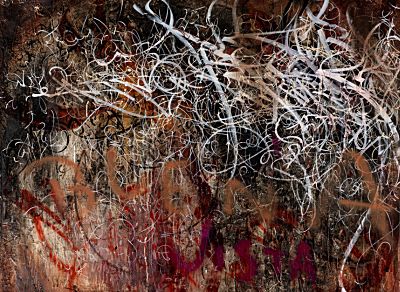
José Parlá
Calligraphic Paintings by José Parlá
more
_______________________
The State of Information
Michael Betancourt
ctheory
If dialectic thinking is essentially alchemical--a collision of opposing forces that creates a new, superior result--the expanded field of nodal interpretation is essentially superposed: the result is held in suspension awaiting a collapse into the specifics of a singular result (that remains fundamentally transient). At the same time, the expanded field of interpretation is one in which all interpretations--even those later disproved empirically--have validity within the range of potential interpretations as interpretations; this situation clearly describes the state of information. There is no distinction made between the empirical validity and non-validity of an interpretation because both exist within the range of potentials and their empirical validity is just one of the dimensions that define them as nodes within the interpretative range. The consequences of the emergence of the state of information as a conceptual apparatus have been implicitly played out within the realm of technical aspiration, critical application, and through the grappling with the paradoxes of competing and variable valuation within both philosophy and culture generally. The conflict between those espousing a singular, particular 'universal' set of values and those critiquing these claims dovetails with the emergence and ascent to dominance of the conceptual underpinnings of the information space that the state of information abstracts. ...(more)
_______________________
Why does the financial industry make such high rents--that is, make more than can be justified by their contribution to economic growth? Is there too little competition? Is it easy to cheat investors or manipulate markets? According to modern economic theory, there may be a lack of adequate information about the finance industry's complex products, which would give these firms a distinct and persistent advantage. Or, alternatively, is there simply a constant flow of inside information?
One can only hope good economists will now turn more of their attention to the sources of this undue advantage. In the meantime, it is increasingly clear that these bonuses are not justified by the competitive marketplace. They are the fruits of unfair economic privilege. The money could be far better invested elsewhere.
- Jeff Madrick
_______________________
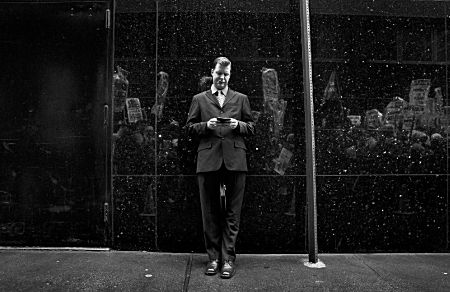
Wall Street
Benjamin Norman
via Joerg Colberg
_______________________
Where have All the broad Shoulders Gone? Or, Labor Day in a Kleptocracy
Juan Cole
Now Americans have convinced themselves that we don't have a working class. Everybody is middle class, even those who make minimum wage in the fast food industry, or those who are kept as part-timers so that the store (I'm looking at you, Walmart) doesn't have to enroll them in a health care program. The closest we get to celebrating the workers who built this country is when we talk about "working families," an odd locution, since aside from the idle rich who defrauded the country into bankruptcy last fall, wouldn't that be everyone? While we have lots of workers, we no longer have an effective labor movement, because Ronald Reagan by example essentially overturned the mid-20th century traditions that had made it unseemly for employers to fire striking workers and hire scab labor. Even the anti-worker Taft Hartley law of 1947 prohibited companies from firing workers for their union activities. But the penalties for illegal union-busting are so light that companies frequently fire employees who so much as suggest organizing a union.(....)
Reagan-Cheney between 1980 and 2008 created a new American aristocracy, a small sliver of super-rich, who buy and sell legislators, create whole "news networks" to present far rightwing fantasies as "news," have their lackeys invade and occupy whole countries, hold themselves above the law, falsify financial statements, and suffer little or no punishment for stealing billions from the pensions of "working families" (i.e. those of us about whom P.T. Barnum remarked, "one is born every minute".) The Republican Party has come to represent these super-rich. Since .1% of the population couldn't actually win elections, they ally with other groups in society. About two-thirds of evangelicals have joined up with them, about a third of Latinos, significant numbers of midwestern rural families, and obviously large numbers of white southerners. In some cases these are lower middle class people on the make, who want to hitch their wagons to the brightest stars in the sky. In others, they share with the super-rich various resentments of the federal government. This alliance of odd bedfellows (think of Paris Hilton married to Joe Sixpack) is what produces the wackiness of Republican Party politics and media. They can't come out and say that they want the country run for the benefit of 300,000 multi-millionaires and billionaires (almost all of them white), so they say they are all in favor of guns, apple pie, Jay-sus and the Confederacy. Sometimes, as with Rudy Giuliani and Mitt Romney, the pretense is so forced as to be implausible even to their minions. Clearly, racism and fear-mongering are also key irrational talking points for the plutocrats seeking support from the white lower middle class (though this route can backfire, as it did in 2008 when Republican fear-mongering about Latino immigration alienated most Latino voters and drove them into the arms of the Democrats.)(....)
I cannot entirely explain why the American super-rich are so much more heartless and stupid than their counterparts in Europe. In fact, they behave politically much more like Afghan and Pakistani big landlords, who pay their peasants a dollar a day and call in the army to put down any organized protests. In part, they have been offered an irresistible temptation by the destruction of organized labor; French workers wouldn't put up with a tenth of the insults visited upon us by our overlords. But it is a dead end, even for the uber-rich. Healthy, educated workers will be key to American economic competition in the world in the coming century. Our super-rich and our politicians are hollowing the country out with their ponzi schemes and their Sparta strategy of projecting military force even as the country's economic base in manufacturing and productivity sinks in comparison to rivals....(more)
via Gordon Coale
_______________________
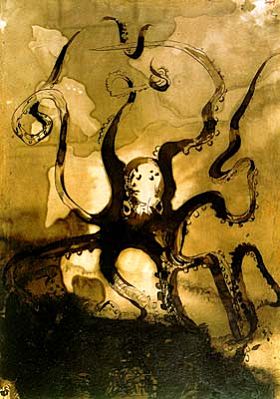
Octopus with the initials V. H.
Victor Hugo
ca. 1866
_______________________
Alfred Jarry
September 8, 1873 - November 1, 1907
Gene Van Dyke
milkmag
"Because of Ubu Roi, Alfred Jarry has become the adopted father of a number of departures from the theatrical right. The symbolists claimed him, as would the surrealists. The family tree has been drawn time and time again down to the futurist and dada movements. Antonin Artaud--one of the single greatest influences on the second-wave avant-garde--was a disciple of Jarry's (naming a theatre in his honor). Martin Esslin linked him to the absurdists. From Breton to Tzara to Beckett--the roads, more often than not, seem to lead back to the head of that madman from Laval. The staging conventions that were broken with Ubu Roi have helped feed the imaginations of designers and directors alike. Any one element is worthy its own analysis--or even better, its own enjoyment. And if you stripped all of these things away you would be left with the one thing that I believe to be Jarry's most revolutionary contribution--Ubu himself. In 1896, the stage met with its fist true anti-protagonist. He is everything that is foul in the world, in a pure sense--devoid of any redeeming characteristic or capacity. He is not diluted with Iago's cunning or Macbeth's guilt. And somehow he is not unlike us."...(more)
An Unrecognized Precursor to Heidegger: Alfred Jarry
Gilles Deleuze
Essays critical and clinical by Gilles Deleuze trans. by Daniel W. Smith and Michael A. Greco
google books
Ubu's Almanac
alfred jarry: absinthe, bicycles and merdre
Dave 'daev' Walsh
"Jarry's writings on the theater are just as useful to the Surveillance Camera Players (SCP) as Artaud's writings on the subject; both can be used to exploit the weird little "theaters" created in public places by the presence of surveillance cameras. Like Artaud, Jarry was fascinated with the possibilities of theatrical space (the theatrical "spectacle") and relatively uninterested in dialogue, story-lines and character development. Drawing upon puppet shows and plays performed by marionettes, Jarry attempted to create a flat or two-dimensional theater ("an ABSTRACT theater," as he refers to it in "Twelve Theatrical Topics"). He used placards to announce the time and location of the dramatic action, and to take the place of scenery and on-stage crowds. In his short essay "On the futility of the 'Theatrical' in the Theater," Jarry explains, "the placard brought in to mark each change in scene saves the onlooker from being regularly reminded of base 'reality' through a constant substitution of conventional sets which he really only sees properly at the moment the scene is being shifted." In any event, as Jarry says in a letter concerning the first performance of Ubu Roi, "No scenery, no array of walkers-on, could really evoke 'the Polish Army marching across the Ukraine.'" And so, rather than attempt to make the pretense work anyway, Jarry used a single actor to hold a placard that said "[I am] The Polish Army."
-
Surveillance Camera Players
_______________________
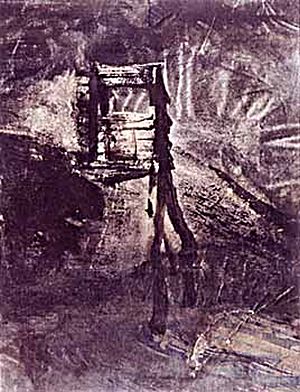
"Pêcherie at night"
Victor Hugo
_______________________
17th issue of The Quarterly Conversation
From The Subversive Scribe
Suzanne Jill Levine
Quarterly Conversation
Translation betrays because, like criticism, it makes choices. Even though one can read two meanings into La traición de Rita Hayworth the title sounds, strikes the Spanish reader’s ear as a raw, forceful, even blasphemous statement. Traición is stronger than betrayal since it also means treason. “Betray,” the verb, strikes the English reader stronger than the noun “betrayal,” and grammatical changes (noun to verb, for example) often serve a translated phrase better than lexical ones. Betrayed by Rita Hayworth sounded stronger, more emphatic in English, a language that privileges “clear senses.” Colloquial immediacy should also be privileged in a novel that has been called a “gallery of voices,” in which the characters speak for themselves in a living Argentine idiom. Ambiguity—or, rather, vagary—would weaken more than enrich the reading of the title in English. The Betrayal of Rita Hayworth sounds literary, Betrayed by Rita Hayworth sounds more spoken: This phrase should sound as if it were uttered by Toto, just as the original Spanish does.
The lesson Toto (Manuel Puig) learns in his coming of age, as several critics have observed, is to become a betraying subject. Nothing is ever resolved at the level of plot or discourse in Puig’s novels. He betrays the reader, as he does the role of author, but that’s because there are no clear-cut messages to be communicated in the world of the emotions. Like Toto, he is an ambiguous manipulator, and in this sense like the translator herself: writing between languages and cultures as she uncovers and replays the elusive relationship between words and feelings, between the spoken and the unspoken....(more)
The Subversive Scribe: Translating Latin American Fiction
Suzanne Jill Levine
_______________________

"Le Gai Château" Flandres
Victor Hugo
ca.1847
_______________________
From Beckett to Brooklyn
Paul Auster interview
The Irish Times
Thirty-five years after he first met Samuel Beckett in a Paris cafe, Paul Auster has picked up a few of his ways. Novels narrated by obsessive men tripping over the perils of memory and through the trapdoors of language: yes. Monologues that pit consciousness against itself; those too.(....)
... Auster still cringes somewhat at the memory of his very first response in that Paris cafe – his first Beckett address, so to speak. “He said, tell me all about yourself. And I had nothing to talk about. Nothing to tell him. So I stammered a bit, and stumbled, and I felt like crawling into a hole.”
But then Beckett stole a cigarette, and sparked it up it with a wisecrack about vices, and the younger writer relaxed a little. And they talked, for a while, “about many things” – the poet John Berryman, who had recently taken his own life; the painter Joan Mitchell, who had coaxed Auster into writing to Beckett and asking for a meeting in the first place; the trials of translation....(more)
via Rhys Tranter
A Piece of Monologue
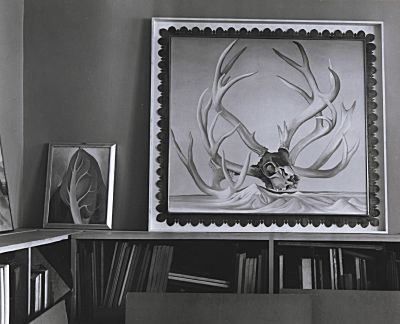
"Detail, An American Place"
Alfred Stieglitz
1939 Alfred Stieglitz/Georgia O'keeffe Archive
Beinecke Rare Book and Manuscript Library
_______________________
On Zero
Alan Dugan
1923 - 2003
The man who first saw nothing
drew a line around it
shaped like a kiss or gasp
or any of the lips' expressions during shock,
and what had been interior
welled from its human source
and pooled, a mirror perilous.
That was the mouth of the horn of agony,
the womb all matter tumbled out of in the first
meaningless avalanche of the concrete,
and I'm afraid that it will be
sewer of all water and the grave of space
so as to be complete.
When his head, dead tired of its theory,
dropped to the mark it made,
his forehead drank the kiss of nothing.
That was not sleep!
His students dove through it
down oceans of absence and
are not remember, but
beautiful wet women ran out of the surf, subtly changed
and laughing over something secret they had learned.
Their navigating sons
sailed past horizons of the sensed
and founded wonderlands!
deep in the deserts of flesh away
from heaven's waters. They have not returned either.
(....)
After sleepers first touch zero at the maw
they wake up in a permanently different light.
They wear its caste-mark as another eye
incapable of sleep or hurt, and burrowing inside.
They're fed to it; it
widens unastonished and they drown: internally.
If only I knew a woman's charm I cannot learn
in whose clear form and lines
the trouble of the problem slept, solved,
oh they would have a lid against its light,
rest in the mystery, and a chance
blindly to venture on in time,
but no such Cyclops
crazed by the price of size
would search the bellies of his sheep
to thank his blinders and their flame-sharp stick;
his eye is the condition of his flock
and his flock is his food and fleece;
so: sack the world's
unfinished business in your balls,
Ulysses, and escape
to soaking Venus or the red plains
of Mars: Nothing might be here.
...(more) Alan Dugan Feature
The Pedestal Magazine
13 Poems by Alan Duganselected by Steven D. Schroeder Dugan at the Poetry Foundation
_______________________
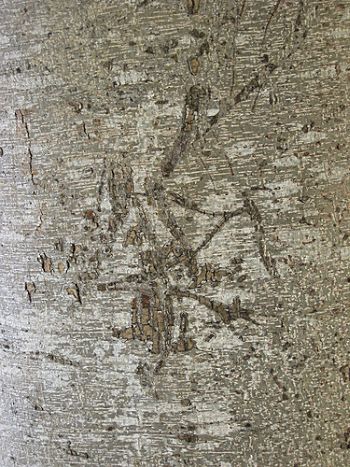
Tree Haptics
Stephen Vincent
The haptic mark - in whatever form it takes - gives us a rendering of a sensual apprehension of space.The marks it makes are fluid. Within any combination of marks we witness the incisions of a particular history. The group of wrinkles in an aging persons face, or the apparent cracks and scars on the bark of a tree’s trunk. These incisions - these haptics - are one of the ways in which we may publicly and intimately witness the pace, rhythm, the shape and character of an historical record. An event’s scripture, its autobiography, if you will. ...(more)
Stephen Vincent's photostream
_______________________
The Desert Island And The Missing People [pdf]
Vanessa Brito
Translated by Justin Clemens
Deleuze could never have written on the arts. He could never have given us tools for interpreting them. Because, contra the procedure that interprets and explicates works, his own consists in extracting from them modes of existence. A strange project that implies that cinematographic images, literary or pictorial images are indiscernible from things of the world, from beings or bodies. Identified with phenomena or with the ensemble of what appears, the images sustained by art neither have a different status from those of other forms of experience, nor a specific perceptible matter: images are things themselves, and, as such, they only have value through the modes of life and activity that they recount to us and which they allow us to see. Such is the relation that Deleuze knotted between art and philosophy. Art is practically always invoked, but finally by never being there, or rather by being always already there as a form of life. This identification between art and life is the index that we must grasp to be up to considering—and naming—what Deleuze does with art. In effect, if Deleuze doesn’t write on art, then of what does he speak when he appeals to Vertov, Rouch, Perrault, the Straubs? What does he do when he speaks to us of cinema? We propose the following response: he speaks to us of belief and fabulation, he manufactures giants, he recounts mythological tales, he appeals to a missing people. What is this tortuous project then, perhaps unfinished, where art, at the same time that it is caught in questions of images and signs, works more subterraneanly for the fabrication of mythical figures and for the recovery of beliefs that bind men to the world? Is it a question of a political project, of the construction of a fable, of a utopian program?
parrhesia :: a journal of critical philosophy
_______________________
That have not been asked:
ten dispatches about endurance in face of walls
John Berger
channeling Andrei Platonov
The poor have no residence. They have homes because they remember mothers or grandfathers or an aunt who brought them up. A residence is a fortress, not a story; it keeps the wild at bay. A residence needs walls. Nearly everyone among the poor dreams of a small residence, like dreaming of rest. However great the congestion, the poor live in the open, where they improvise, not residences, but places for themselves. These places are as much protagonists as their occupants; the places have their own lives to live and do not, like residences, wait on others. The poor live with the wind, with dampness, flying dust, silence, unbearable noise (sometimes with both; yes, that’s possible!) with ants, with large animals, with smells coming from the earth, rats, smoke, rain, vibrations from elsewhere, rumours, nightfall, and with each other. Between the inhabitants and these presences there are no clear marking lines. Inextricably confounded, they together make up the place’s life.
Twilight was setting in; the sky wrapped in cool grey fog, was already being closed off by darkness; and the wind, after spending the day rustling stubble and bare bushes that had gone dead in preparation for winter, now lay itself down in still low places on the earth...
The poor are collectively unseizable. They are not only the majority on the planet, they are everywhere and the smallest event speaks of them. This is why the essential activity of the rich today is the building of walls – walls of concrete, of electronic surveillance, of missile barrages, minefields, frontier controls, and opaque media screens.
(....)
The secret of storytelling amongst the poor is the conviction that stories are told so that they may be listened to elsewhere, where somebody, or perhaps a legion of people, know better than the storyteller or the story’s protagonists, what life means. The powerful can’t tell stories: boasts are the opposite of stories, and any story however mild has to be fearless and the powerful today live nervously.
A story refers life to an alternative and more final judge who is far away. Maybe the judge is located in the future, or in the past that is still attentive, or maybe somewhere over the hill, where the day’s luck has changed (the poor have to refer often to bad or good luck) so that the last have become first.
Story-time (the time within a story) is not linear. The living and the dead meet as listeners and judges within this time, and the greater the number of listeners felt to be there, the more intimate the story becomes to each listener. Stories are one way of sharing the belief that justice is imminent. And for such a belief, children, women and men will fight at a given moment with astounding ferocity. This is why tyrants fear storytelling: all stories somehow refer to the story of their fall.
Wherever he went, he only had to promise to tell a story and people would take him in for the night: a story’s stronger than a Tsar. There was just one thing: if he began telling stories before the evening meal, no-one ever felt hungry and he didn’t get anything to eat. So the old soldier always asked for a bowl of soup first. ...(more)
_______________________
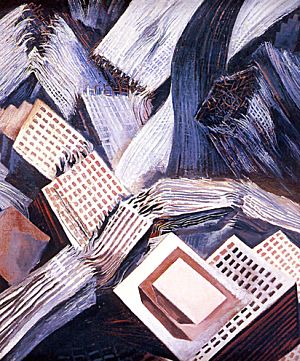
Los muertos
1931
José Clemente Orozco
d. Sept. 7, 1949
_______________________
Crisis and Hope
Theirs and ours
Noam Chomsky
It is also important to remind ourselves that the notion of workers’ control is as American as apple pie. In the early days of the industrial revolution in New England, working people took it for granted that “those who work in the mills should own them.” They also regarded wage labor as different from slavery only in that it was temporary; Abraham Lincoln held the same view.
And the leading twentieth-century social philosopher, John Dewey, basically agreed. Much like ninetheenth-century working people, he called for elimination of “business for private profit through private control of banking, land, industry, reinforced by command of the press, press agents and other means of publicity and propaganda.” Industry must be changed “from a feudalistic to a democratic social order” based on workers’ control, free association, and federal organization, in the general style of a range of thought that includes, along with many anarchists, G.D.H. Cole’s guild socialism and such left Marxists as Anton Pannekoek, Rosa Luxemburg, Paul Mattick, and others. Unless those goals are attained, Dewey held, politics will remain “the shadow cast on society by big business, [and] the attenuation of the shadow will not change the substance.” He argued that without industrial democracy, political democratic forms will lack real content, and people will work “not freely and intelligently,” but for pay, a condition that is “illiberal and immoral”—ideals that go back to the Enlightenment and classical liberalism before they were wrecked on the shoals of capitalism, as the anarchosyndicalist thinker Rudolf Rocker put it 70 years ago.
There have been immense efforts to drive these thoughts out of people’s heads—to win what the business world called “the everlasting battle for the minds of men.”...(more)
_______________________
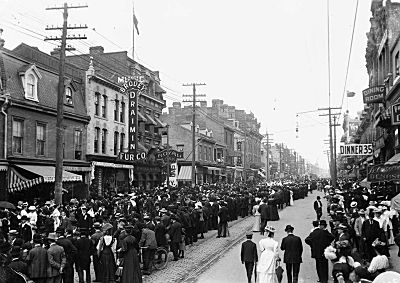
Labour Day
Toronto
c. 1900
_______________________
As soon as labour in the direct form has ceased to be the great well-spring of wealth, labour time ceases and must cease to be its measure and hence exchange value [must cease to be the measure of] use value.'
Karl Marx, Grundrissei
The return of the ethical economy- in five installmentsAdam Arvidsson (to start with..)
We are, it would seem, in the midst of a historical crisis of the capitalist system. As the dynamo effects of the sub-prime collapse ripple through the economy, from financial markets to consumer spending and industrial production, it has become common to point at how our present capitalist system lacks long-term sustainability. If this used to be the privilege of a handful of left-leaning economists like André Gunder Frank (2005) or Robert Brenner (2004), economists, politicians and business leaders who used to be more than happy with the existing order of things have now joined the ranks. Even Richard Florida, whose theories of the ‘creative class’ stood at the heart of the gentrification-driven real estate boom that preceded the present crisis now proclaims that’[t]he housing bubble was the ultimate expression, and perhaps the last gasp, of an economic system some 80 years in the making, and now well past its “sell-by date” (Florida, 2009:9).
However, in order to understand why the ’system is past its “sell-by date”‘ and, by implication, what can be done about this, it is not enough to go beyond populist cries of managerial greed and corrupt banks. We need to move even deeper into the heart of the matter, beyond even most current explanations that focus on the perversities of advanced financial instruments and the need for tighter regulation of financial markets; we need to ‘descend into the depths of production‘ to quote (an increasingly popular) Marx (1939[1973]:105) once more, and engage with the fundamental concept of any economic analysis: value.(....)
this crisis of transition is driven by the emergence, within the institutional framework of capitalism itself of a new mode of production that works according to a logic of value that is different from that of industrial capitalism. Consequently a lot of the wealth actually produced by the economy cannot be adequately valued and, by implication, managed within existing structures of accounting, control and measurement. Seen this way, the crisis we are now living through is essentially a value crisis, where, as the opening quote claims, exchange value no longer adequately reflects use value, or, to put it in less cryptic terms, there is a general sensation that a lot of the real values that circulate in our economy cannot be adequately represented. ...(more)
via Tom Matrullo
_______________________
Museum of Stones
Carolyn Forche
This is your museum of stones, assembled in matchbox and tin,
collected from roadside, culvert, and viaduct,
battlefield, threshing floor, basilica, abattoir,
stones loosened by tanks in the streets
of a city whose earliest map was drawn in ink on linen,
schoolyard stones in the hand of a corpse,
pebble from Apollinaire’s oui,
stone of the mind within us
carried from one silence to another,
stone of cromlech and cairn, schist and shale, hornblende,
agate, marble, millstones, and ruins of choirs and shipyards,
chalk, marl, and mudstone from temples and tombs,
stone from the silvery grass near the scaffold,
stone from the tunnel lined with bones,
lava of the city’s entombment,
...(more)
thanks to Philip Metres
Behind the Lines: Poetry, War, & Peacemaking
_______________________
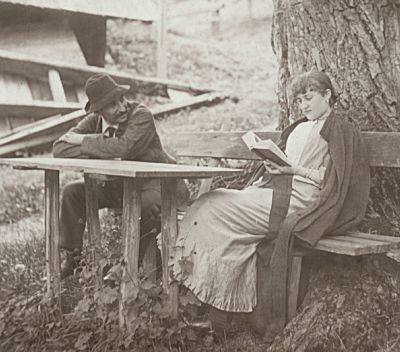
Waiting for a Smile
Alfred Stieglitz
_______________________
Panic Encyclopedia:
The Definitive Guide to the Postmodern Scene
Arthur Kroker, Marilouise Kroker, David Cook
1989
Panic Ideology
In his "Theses on the Philosophy of History," Walter Benjamin wrote that "a state of emergency" is the rule rather than the exception in bourgeois existence. Now, more than ever, Benjamin's prophetic insights appear as an early diagnosis of the unprecedented threat to civilized life presented by the politics of the new right. The election of George Bush [ the first ], this too-perfect organ grinder for multinational corporate interests, and the systematic playing out through the late 1980s of a merciless American foreign and domestic policy, point to the surfacing, not only in Europe this time (in the guise of "popular capitalism" in Thatcher's Britain, Kohl's West Germany, and in technocratic France) but also in North America, of the beast that is at the heart of the western mind. In the face of this state of emergency, it is impossible to be silent. For this is an authoritarian politics which is as relentless in its assaults on democratic struggles in Central America as it is pitiless in its "reality therapy" for the poor, for children, for the aged. We thought Spencer was finally dead, only to discover in the slogans of "supply side economics" the birth anew of social darwinism.(...)
...over and beyond the strident political vocabulary of the new right, something else is happening. The new right is so potentially dangerous because it represents a broader awakening of an "ideology in waiting." And this newly surfacing ideology has its basis in the nihilism of a middle-class gone authoritarian. In the end, fear of loss of privilege, impotence in the face of overwhelming power and despair over the failure of the liberal consensus produce a psychological "readiness" for the therapeutic of the authoritarian state.(...)
Unfortunately, the private zone of emotional stillness sought by the bourgeois mind is itself illusory. One lesson of the hegemonic tendencies of the technological order is that the social as well as the psychoanalytical foundations of identity have already been colonized....(more)
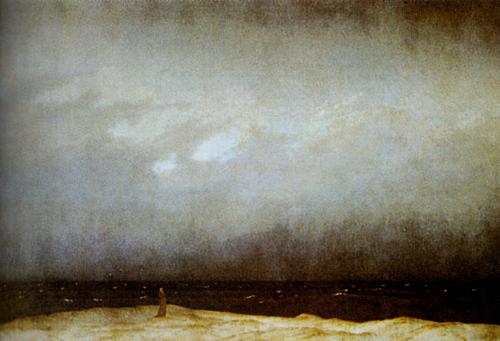
Monk by the sea
Caspar David Friedrich
Sept 5, 1774 – May 7, 1840
_______________________
Nihil Unbound: Enlightenment and Extinction
Ray Brassier
scribd
Nature is not our or anyone's 'home', nor a particularly beneficent progenitor. Philosophers would do well to desist from issuing any further injunctions about the need to re-establish the meaningfulness of existence, the purposefulness of life, or mend the shattered concord between man and nature. Philosophy should be more than a sop to the pathetic twinge of human self-esteem.
via infinite thØught who, incidentaly, has a new book coming out - One Dimensional Woman
.....................................................
Nihil Unbound by Ray Brassier
reviewed by Daniel Miller
new humanist
The bulk of Nihil Unbound is composed of a series of readings of weighty philosophical texts. The principal players here are the American brain scientist Paul Churchland and the French triad of Quentin Meillasoux, Alain Badiou and François Laruelle. This is an idiosyncratic assembly, united more by a shared radicalism then by any shared interests. Brassier does not pretend otherwise. The stance he adopts towards them is that of a scavenger, not a mediator.
Armed with his all-nullifying event of extinction, Brassier wields it like a kind of scalpel, operating to cut the last soft flesh away from the clean white bones of these figures. The idea is to assemble a sturdy conceptual architecture, able to stand on its own without supernatural support.
For each of these figures, the basic line is the same: “One more effort, philosophers, if you would be realists!” The only exception to this pattern is the elusive and obscure François Laruelle, the philosopher who developed a branch of philosophy he calls “non-philosophy”. Brassier is possibly the only man in the world to have read Laruelle, and his take on him is wholly positive. As he understands it: “Laruelle provides the key to understanding the diachrony inherent in what Meillasoux calls ‘absolute time’ and allows us to appreciate that ‘it is no longer thought that determines the object, whether through representation or intuition, but rather the object that seizes thought, and forces it to think it ... according to it.’”
Let me confess at this point that I have only a dim inkling, at best, of what this might mean. Written in an extraordinary form of technical prose, Nihil Unbound is intended for a specialised audience, and shows it. Throughout this book, one is never quite sure whether it is the ideas that are difficult, or the style. This is a particular shame since at several points in this book Brassier reveals a brilliantly dramatic touch that he could easily have used more often.
Ultimately, this book is a stepping-stone to potentially greater things. It does not really accomplish what it sets out to achieve, but rather only sets the stage for it. What it works towards is a revitalised theory that would permit a truly rational stance on reality. If this were to be gained, the faithful could be permitted to scrabble around in the basement looking for the light switch as much as they liked, because rationalists would hold in their hands the map to the entire house....(more)
Axiomatic heresy
The non-philosophy of Francois Laruelle
Ray Brassier
_______________________

John Cage
Sept 5, 1912 – Aug 12, 1992 "I have nothing to say
and I am saying it
and that is poetry
as I needed it"
-
John Cage
Cage at the Electronic Poetry Center and UbuWeb Sound
The Music of Verbal Space: John Cage's "What You Say"
Marjorie Perloff
_______________________
Powers of Recuperation
Adrienne Rich
a public space
1.
A woman of the citizen party—what’s that—
is writing history backward
her body the chair she sits in
to be abandoned repossessed
The old, crusading, raping, civil, great, phony, holy, world,
second world, third world, cold, dirty, lost, on drugs,
gangrenous, maiming, class
war lives on
a done matter she might have thought
ever undone though plucked
from before her birthyear
and that hyphen coming after
She’s old, old, the incendiary
woman
endless beginner
whose warped wraps you shall find in graves
and behind glass plundered
(....)
5.
Every built thing with its unmeant
meaning unmet purpose
every unbuilt thing
child squatting civil
engineer devising
by kerosene flare in mud
possible tunnels
carves in cornmeal mush irrigation
canals by index finger
all new learning looks at first
like chaos
the tiny magnet throbs
in citizen’s pocket
...(more)
_______________________
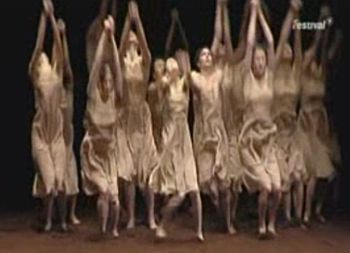
Pina Bausch
Directed by Anne Linsel (2006)
2006; 44m
UbuWeb Film
"Before choreographer Pina Bausch and her Tanz-theater Wuppertal were known around the world, her new, unusual and original body language was ill-received. In the early days the audience (and most critics) were irritated and confused. Tumultuous scenes in the audience were not unusual. Pina Bausch speaks about the beginnings of the Tanztheater and the inescapable path she felt she had to follow. She talks about rehearsals, her pieces (more than 30 by now), her co-productionswith other cities and countries and being on tour. Some of her dancers, the set designer Peter Pabst and the costume designer Marion Cito, all of whom have been with Pina Bausch for decades, talk about working with her. Shot in Venice at the Teatro Fenice, in Lisbon and Brussels, and in Wuppertal with the support of WDR Cologne, and Arte France."
_______________________
Pina Bausch
or the Joining of Emotion and Thought in the Movement of Bodies on Stage
Anny Ballardini
Ekleksographia
A mortal can only start from here, from his mortality.
- Jacques Derrida, Aporias
Emil Nolde_Otto Dix_Käthe Kollwitz_an Edward Munch
Egon Schiele breathes all through
in its almost irrecoverable Romanticism
I was 19 and Pina Bausch was the theater
as much as Camus had redefined my world
together with Samuel Beckett, Sartre, Ionesco
we all knew her, as we knew Andy Warhol
maybe her opposite, hers a distinct search, inward
connected with postwar Germany
a Europe left without hope
_intense _quality _the special talent of the single dancer
following Pina Bausch's Idea
the compromise:
a superior attainment [Nietzsche, Leonardo]
in an exquisite decadence
anguish
the violence
the violence of personal relationships
(smile, show your teeth, smile)
satirical grotesque
a farce
...(more)
Ekleksographia is an exercise in asymmetrical publishing, and is a shoe (or even two!) thrown at the spotlit shrug and yawn. via Joseph Duemer
_______________________
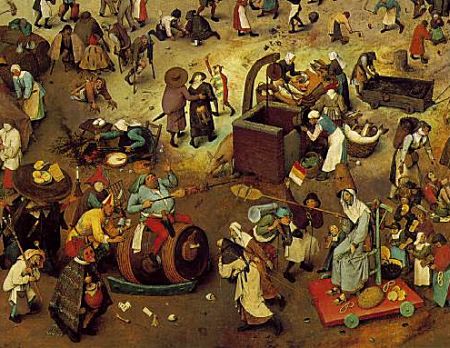
Battle Between Carnival and Lent
detail
Pieter Bruegel the Elder
1559
_______________________
Variations on the Right to Remain Silent
Anne Carson contemplates translation
A Publice Space
Silence is as important as words in the practice and study of translation. This may sound like a cliché. (I think it is a cliché. Perhaps we can come back to cliché.) There are two kinds of silence that trouble a translator: physical silence and metaphysical silence. Physical silence happens when you are looking at, say, a poem of Sappho's inscribed on a papyrus from two thousand years ago that has been torn in half. Half the poem is empty space. A translator can signify or even rectify this lack of text in various ways-with blankness or brackets or textual conjecture-and she is justified in doing so because Sappho did not intend that part of the poem to fall silent. Metaphysical silence happens inside words themselves. And its intentions are harder to define. Every translator knows the point where one language cannot be translated into another. Take the word cliché. Cliché is a French borrowing, past participle of the verb clicher, a term from printing meaning "to make a stereotype from a relief printing surface." It has been assumed into English unchanged, partly because using French words makes English-speakers feel more intelligent and partly because the word has imitative origins (it is supposed to mimic the sound of the printer's die striking the metal) that make it untranslatable. English has different sounds. English falls silent. This kind of linguistic decision is simply a measure of foreignness, an acknowledgment of the fact that languages are not sciences of one another, you cannot match them item for item. But now what if, within this silence, you discover a deeper one-a word that does not intend to be translatable. A word that stops itself....(more)
via Words Without Borders
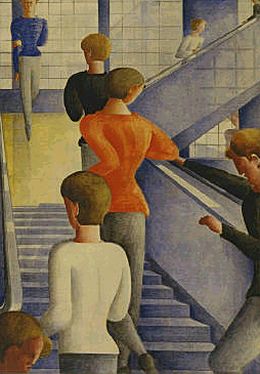
Bauhaus Stairway
Oskar Schlemmer
(1932)
_______________________
Changelings
Loren Eiseley
from Notes of an Alchemist
Fox masks, wolf masks, I try them on
as if I were a savage.
Long ago I realized
from scratchings traced
on cave walls
or from dim ethnologies,
from collections hidden
in musty storerooms or museum basements,
from phrenological attempts to see
the beast in man,
how much of beast persisted.
Here was I
cursed by these foxes and their kin the wolves
to see them everywhere.
...(more)

Loren Eiseley
b. Sept. 3, 1907 Sunflower Forest, A Loren Eiseley Reader
Eiseley on google books
The Firmament of Time
All the Strange Hours: The Excavation of a Life
The star thrower
The Lost Notebooks of Loren Eiseley The Invisible Pyramid
Returning Insight to Storytelling:
Science, Stories, and Loren Eiseley
Jason Sanford
Toward a dialogue of understandings:
Loren Eiseley and the critique of science
Mary Ellen Pitts
google books
Fox at the Wood's Edge: A Biography of Loren Eiseley
Gale E. Christianson
google books
.....................................................
I too am aware of the trunk that stretches loathsomely back of me along the floor. I too am a many-visaged thing that has climbed upward out of the dark of endless leaf falls, and has slunk, furred, through the glitter of blue glacial nights. I, the professor trembling absurdly on the platform with my book and spectacles, am the single philosophical animal. I am the unfolding worm, and mud fish, the weird tree of Igdrasil shaping itself endlessly out of darkness toward the light.
-
The Firmament of Time
Written deep in the human subconscious is a simple terror of what has come with us from the forest and sometimes haunts our dreams.
-
The Invisible Pyramid
I am not nearly so interested in what monkey man was derived from as I am in what kind of monkey he is to become.
-
The Lost Notebooks
Man would kill for shadowy ideas more ferociously than other creatures kill for food, then, in a generation or less, forget what bloody dream had so oppressed him.
-
The Star Thrower
_______________________
Surrealism is above all a state of mind, it does not advocate formulas. The most important point is to put oneself in the right frame of mind. No Surrealist is in the world, or thinks of himself in the present, or believes in the effectiveness of the mind as spur, the mind as guillotine, the mind as judge, the mind as doctor, and he resolutely hopes to be apart from the mind. The Surrealist has judged the mind. He has no feelings which are a part of himself, he does not recognize any thought as his own. His thought does not fashion for him a world to which he reasonably assents. He despairs of attaining his own mind.
-
Antonin Artaud
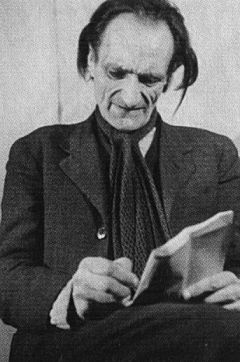
Antonin Artaud
Sept 4, 1896 – March 4, 1948
photo 1947
The theater and its double
Antonin Artaud
google books 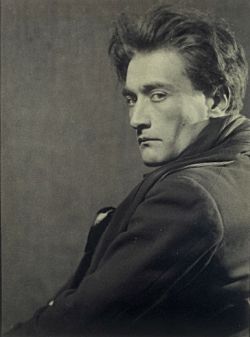
Artaud by Man Ray
1926
Artaud Anthology
google books
Antonin Artaud: a critical reader
Edward Scheer
google books
Kristeva on Antonin Artaud
An interview with Julia Kristeva filmed in 1996 at Sydney Festival devoted to "100 years of cruelty"
(28'30)

Artaud
La Passion de Jeanne d’Arc
1927-1928
Saint Artaud
_______________________
Then You Are Them
Fredric Jameson reviews The Year of the Flood by Margaret Atwood
In a post-feminist age, whose great writers (Ursula Le Guin, Toni Morrison, Christa Wolf) are not women writers but just writers, Atwood does not easily fit some category labelled feminist: The Robber Bride, whose male figures are mostly not even violent but simply inept (the masculine ‘masquerade’, said Lacan, borrowing the concept from Helene Deutsch and adapting it to ‘masculinity’ and machismo, is mostly ridiculous), positions the very centre of evil in a woman. Is Atwood then some kind of ecologist? But Nature, in her work, goes all the way back to her 1972 novel Surfacing, with its terrifying Deleuzian devenir-animal. Yet there is a category into which she squarely fits and without which she cannot fully be understood, a category of which at least 300 million English-speakers generally need to be reminded: she is a Canadian, and no little of her imaginative power comes from her privileged position above the border of the lower 48. The Fall is not properly grasped unless it is understood to be a fall into Americanism, as the magnificent rant from Surfacing reminds us:
It doesn’t matter what country they’re from, my head said, they’re still Americans, they’re what’s in store for us, what we are turning into. They spread themselves like a virus, they get into the brain and take over the cells and the cells change from inside and the ones that have the disease can’t tell the difference. Like the Late Show sci-fi movies, creatures from outer space, body snatchers injecting themselves into you, dispossessing your brain, their eyes blank eggshells behind the dark glasses. If you look like them and talk like them and think like them then you are them.
When the narrator was little, the idea of evil was Hitler; but in the world of grown-up violence and Nature, a more sickening metaphysics begins to develop: ‘The trouble some people have being German, I thought, I have being human . . . then I realised it wasn’t the men I hated, it was the Americans, the human beings, men and women both.’ It is a disease you can observe: ‘Second hand American was spreading over him in patches, like mange or lichen. He was infested, garbled, and I couldn’t help him: it would take such time to heal, unearth him, scrape down to where he was true.’ But ‘American’ is also technology, mechanisation, mass production: ‘The machine is gradual, it takes a little of you at a time, it leaves the shell. It was all right as long as they stuck to dead things, the dead can defend themselves, to be half dead is worse. They did it to each other also, without knowing.’
This then is the world of Atwood’s dystopia, for which, in this global near future, the term American is no longer necessary. Its colours have a loathsome pastel quality, like drugstores; its bunny suits and fluffy fabrics reflect the bad taste of infantile mass production; the bloody physical violence is that of cartoons rather than Hitler. If there is aesthetic pleasure here, it is that of a syrupy nausea that repeats on you; so that the end of the world has some of the cleansing, bracing effect of sand and waste landscape, of the seashore. But it is still better to think of it in Adam One’s reassuring words:
What a cause for rejoicing is this rearranged world in which we find ourselves! True, there is a certain – let us not say disappointment. The debris left by the Waterless Flood, like that left by any receding flood, is not attractive. It will take time for our longed-for Eden to appear, my Friends.
But how privileged we are to witness these first precious moments of Rebirth!...(more)
_______________________

Pharmacy
1910 - 1915
News in the 1910s
Bain News Service in about 1910-1912
(4600 images)
library of congress flickr set George Grantham Bain Collection
_______________________
Placebos Are Getting More Effective.
Drugmakers Are Desperate to Know Why.
Steve Silberman
wired
Why are inert pills suddenly overwhelming promising new drugs and established medicines alike? The reasons are only just beginning to be understood. A network of independent researchers is doggedly uncovering the inner workings-and potential therapeutic applications-of the placebo effect. At the same time, drugmakers are realizing they need to fully understand the mechanisms behind it so they can design trials that differentiate more clearly between the beneficial effects of their products and the body's innate ability to heal itself. A special task force of the Foundation for the National Institutes of Health is seeking to stem the crisis by quietly undertaking one of the most ambitious data-sharing efforts in the history of the drug industry. After decades in the jungles of fringe science, the placebo effect has become the elephant in the boardroom....(more)
via Shaun Mullen
_______________________
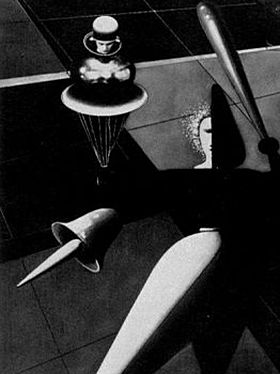
The Triadic Ballet
Oskar Schlemmer
1922
_______________________
Extracts Herra Darwinin puutarhuri
(‘Mr Darwin’s gardener’
Kristina Carlson
Translated by David McDuff
Books from Finland
Interview with Kristina Carlson
_______________________

Große Brücken Revue
inauguration of the Frankfurt Bridges
Oskar Schlemmer _______________________
Positively Delusional
John Summers
reviewing Bright-sided: How the Relentless Promotion of Positive Thinking Has Undermined America by Barbara Ehrenreich
Positive thinking should never be the same after Barbara Ehrenreich’s Bright-Sided. But as Ehrenreich herself shows in a sketch of the movement’s history, its theorists, hucksters, and practitioners have thumbed their noses at reason ever since Mary Baker Eddy popularized New Thought with the mind-over-matter healing doctrine of Christian Science. Led by preacher Joel Osteen, motivational guru Tony Robbins, and academic psychologist Martin Seligman, among many others, the national cult of uplift abounding has lately generated subprime mortgages, megachurches, and a “pink-ribbon culture” that promotes a mind-cure-style approach to treating breast cancer: Maintaining a positive outlook, Ehrenreich learned firsthand, is supposed to boost the victim’s immune system.
Ehrenreich is a sharp and reliable student of the divided middle class, as good as the American left can boast. In attacking the thick irrationality of our public lives, Bright-Sided homes in on a particularly salient line of argument—that positive thinking is not only preposterous but pernicious: “The effort of positive ‘thought control,’ which is always presented as such a life preserver, has become a potentially deadly weight—obscuring judgment and shielding us from vital information. Sometimes we need to heed our fears and negative thoughts, and at all times we need to be alert to the world outside ourselves, even when that includes absorbing bad news and entertaining the views of ‘negative’ people. As we should have learned by now, it is dangerous not to.” Positive thinking, the stepchild of Emersonian self-reliance, “has undermined America.”
The thesis contains a paradox. Why should a movement committed in advance to the notion that prosperity is largely a matter of self-confidence flourish in times of institutional failure? Doesn’t preaching a doctrine of attitude adjustment insult one’s intelligence in a contracting labor market? In fact, Americans have always been great dreamers. The 1930s, the heyday of success manuals, made best-selling authors of idiots savants like Dale Carnegie, Walter Pitkin, Dorothea Brande, Napoleon Hill, and other fools for good news and easy money. Let Your Mind Alone!, cried James Thurber, in a 1937 collection of salvos aimed at these writers’ contempt for social ethics. Then Norman Vincent Peale published The Power of Positive Thinking in 1952, and all was lost....(more)
_______________________

Herman A. "Germany" Schaefer
(1876-1919)
News in the 1910s
_______________________
Talking Pictures
Jordan Bear reviews Dorothea Lange: A Life Beyond Limits by Linda Gordon and Daring to Look: Dorothea Lange's Photographs and Reports from the Field by Anne Whiston Spirn
book forum
It is easy enough to identify the basis of the resurgent interest in Lange’s photographs, surveying as they do the human consequences of corporate abandon, environmental spoliation, and resistance to the government’s ability to alleviate suffering. What seems most salient about her images now is not the easy, maudlin sentimentality generally ascribed to them. The story Lange tells—a visual and literary synthesis—is one that preserves the possibility of diverse and even incompatible voices, an expression of democracy’s highest aspirations. “No country has ever closely scrutinized itself visually that I know,” she noted in the 1964 television interview, as the explosion of the civil rights movement sought to bring the nation closer to the kind of equality her images evinced. “I know what we could make of it if people only thought we could dare look at ourselves.”...(more)
also in bookforum - sept/oct/nov 2009
Crash Course
Joan Richardson reviews Morris Dickstein's Dancing in the Dark: A Cultural History of the Great Depression
Imprisoner’s Dilemma
Kim Phillips-Fein reviews Punishing the Poor: The Neoliberal Government of Social Insecurity by Loïc Wacquant
_______________________

calendar for Morisawa Printing Co., 80s
Yasuhiko Kida (illus), Katsuhiro Kinoshita (designer)
Give Us Back Man - Japanese Graphic Design
A Journey Round My Skull
_______________________
Autumn Fugue
Brenda Hillman
A book was sometimes held in your hand
when the Committee on Understanding met
as you waited for them to call you in
& the man who mowed the graveyard
waved with a circular wave
in the manner of cousins under the elm
where it seemed sweet spices
had been cast down near accordion streets
so once the small democracies
had begun, time could make an exception
for owls with the faces of seeds
that looked just like themselves only open;
it is late & sweet with a late
democratic sweetness when seeds
had been cast down in the manner of
spices, where once the small committees
had begun, time played accordion
with its foot in the door, & you felt
at ease in a circular way
so even had the parties called your name
you would not have been wrong;
the elms had made an exception
& a book was sometimes found in your hand
that looked just like itself, only open—

lanark hedgerow
photo - mw
_______________________
Walking
Marjan Strojan
Translated from the Slovene by Marjan Strojan
words without borders
(....)
We dared each other to climb the fence for the stench
of the place when they kept it open for business.
Then, on a sweep of a chill, birds fell silent,
the buzz and the creek observing
the evensong bell from across
the roof-tops of beech-
trees and firs.
Nothing was going to stop me now, yet my feet would take me
no farther into the night' s wall of silence. I sat on a stump,
daring the moon to come up. No moon came and no
rabbits turned up either. Except the ones in my
head, still browsing about my sore feet,
their eyes red in the night with
the glow of the holy-
blood flowers.
...(more)
Walking The World
Words Without Borders: September 2009
in collaboration with Orion magazine
_______________________
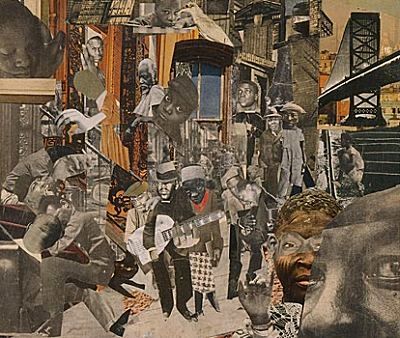
The Street
Romare Bearden
1964
_______________________
Guardian Of Language
An Interview with Hélène Cixous
by Kathleen O'Grady
(March 1996)
For me, theory does not come before, to inspire, it does not precede, does not dictate, but rather it is a consequence of my text, which is at its origin philosophico-poetical, and it is a consequence in the form of compromise or urgent necessity. Each time I have written or that I write a so-called "theoretical" text - in quotations because in reality my theoretical texts are also carried off by a poetic rhythm - it has been to respond to a moment of tension in cultural current events, where the ambient state of discourse - academic discourse, for example, or journalistic or political discourse - has pushed me to go back over things, to stop my journey and take the time to emphasize, to display in a didactic manner the thinking movement which for me was indissociable from my poetic movement, but which seemed to me to be entirely misunderstood, forgotten or repressed indeed by the topical scene. So all that is called "theoretical" in my work is in reality simply a kind of halt in the movement that I execute in order to underline in a broad way what I have written or what has been possible to read for a long time in my fictional texts. Never has a theory inspired my poetic texts. It is my poetic text that sits down from time to time on a bench or else at a café table - that's what I am in the process of doing at this moment by the way - to make itself heard in univocal, more immediately audible terms. In other words, it is always a last resort for me. So no, it does not provide an additional ethico-political structure; it is the concession a poet makes in accepting pedagogic responsibility....(more)
_______________________

Hereford Cathedral Chained Library
Librophiliac Love Letter
A Compendium of Beautiful Libraries
Curious Expeditions
_______________________
Excerpt from
Desire for a Beginning
Edmond Jabès
1912 - 1991
translation by Kevin P.Q. Phelan
"...a book," he said, "that I will never write because no one can write it, as it is a book:
"-- against the book.
"-- against thought.
"-- against truth and against the word.
"-- a book, therefore, that unravels as it forms.
"-- against the book because the book has, for content, only itself, and it is nothing.
"-- against thought because thought is incapable of conceiving its totality or even nothing.
"-- against truth because truth is God and God eludes thought; against the truth, therefore, which remains for us a legendary unknown.
"-- against speech, finally, because the spoken word only says what it is able to and this fragment is the nothing that only nothing can express.
"And yet I know :
"-- that the book writes against a book which is seeking to annihilate it.
"-- that thought thinks against a thought which craves its position.
"-- that truth is imposed through the lived moment as if it were the only moment to be lived.
"-- that the word, as it fades, reveals nothing but the distress of the man it erases".
...(more)
.....................................................
The Book of Questions: The book of questions. The book of Yukel Vol. 1
Edmond Jabès
translated by Rosmarie Waldrop
google books
The Book of Questions: Yaël. Elya. Aely. El, or The last book Vol. 2
Edmond Jabès
translated by Rosmarie Waldrop
google books
From the book to the book: an Edmond Jabès reader
google books
The little book of unsuspected subversion
Edmond Jabès
translated by Rosmarie Waldrop
google books
.....................................................
Lavish absence: recalling and rereading Edmond Jabes
Rosmarie Waldrop
Judaism, Summer-Fall, 2003
_______________________
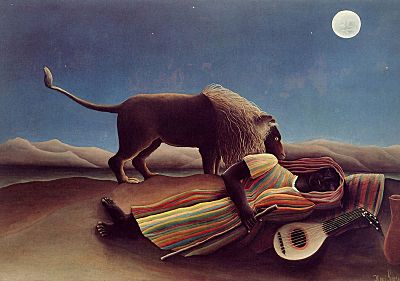
The Sleeping Gypsy
Henri Rousseau
(May 21, 1844 – September 2, 1910)
_______________________
The Audit Is Done
An Anthology of 20th Century Hungarian Poetry
Selected and translated by Peter Zollman
European Cultural Review
.....................................................
Ars Moriendi
(for Peter Zollman)
Győző (Victor) Határ
translated by Peter Zollman
"the arts and sciences are makeshift dams against death"
-
St Gregory of Nyssa
as I get up with aches and pains
and leave the well worn bed where I recline
to bring the night's deadbeat remains
in sleepless bundles through the customs line
the sedative has no effect
all guilty of neuralgia come to grief
my nights are permanently wrecked
I've lost the luxury of pain relief
no matter how my bed is lined
with blind shadows or beams of blazing light
in here I can no longer find
that precious privilege: a painless night
oh poetry you deadly curse!
there's no escape from your unholy rhymes
you makeshift sandbag dams of verse!
I've sworn to smash you up - a thousand times
it's death - it is this surging sea
that sandbag verses aren't able to dam
resistance is sheer lunacy
you've vowed to give it up - ad nauseam
...(more)
_______________________
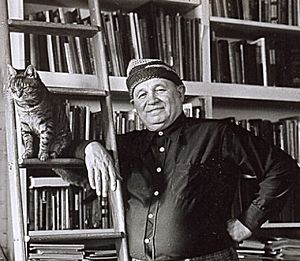
Romare Bearden
(September 2, 1911 – March 12, 1988) The Art of Romare Bearden: A Resource for Teachers
.....................................................
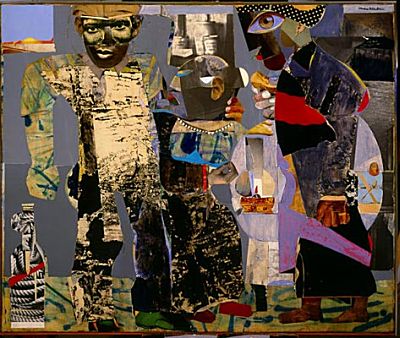
Return of the Prodigal Son
1967
Romare Bearden

Trailways bus station
Bainbridge, Georgia
1978
Paul Kwilecki
Beyond Beauty
Photographs from the Duke University Special Collections Library
_______________________
Speech Adrift
Spurious
August 31, 2006
A drifting voice, a voice adrift: I think, too, of the long Christmas night of Fanny and Alexander, and those who speak until dawn and past dawn, following speech as it drifts and allowing themselves to be carried by speech. What is there to be said? Of what does speaking speak? Of itself, of its failure to arrive at itself.
Late at night, it widens. Late, very late, true speech begins that turns each of us, speaker, listener, aside. True speech, that speaks of itself, of the surprise of itself, carrying the voice and be carried by it. For isn't it the voice, in its grain that lets it resound? Doesn't it need what allows it to speak?
But the voice needs speech to be spoken. Needs, then, what cannot be said - or that does not do so directly, according to the order of the day. Speak at night, and you approach the impossibility of speech - the impossibility, that is, of marshaling what speaks in your own name. ...(more)
_______________________
Louis Dudek
From: En México
Louis Dudek
Someday we shall come again to the poem
as mysterious as these trees,
of various texture,
leaves, bark, fruit
(the razor teeth so neatly arranged,
so clean the weathered root).
There is the art of formal repetition
and the art of singular form—lines clean
as a wave-worn stone. . .
Study the ancient habits
of the most disorderly people.
Where did reason arise?
The science of cleanness—
fastidiousness in art?
Somewhere in this, the market, the church,
the commissary.
No matter how steamy the jungle,
small leaves are perfect in detail.
Order remains unimpaired
in man and in matter,
despite all poverty, insanity, and war—
the jungle, in its excesses.
From wherever you are, begin!
Poems of Louis DudekPoetry Quebec
English language poets in Quebec
Poems from Atlantis
Louis Dudek google books
The poetry of Louis Dudek: definitive edition
google books The Montreal forties: modernist poetry in transition
Brian Trehearne
google books
.....................................................
Louis Dudek: Canada’s “Ideogram of Reality"
Tony Tremblay
“The heaving green like a crashing wave
has broken.
Rubble of black branches
and wave-worn hillsides appear.
The leaping crickets, the sleeping birds, grow silent.
Distant thunder threatens
A storm at sea.
One solitary fleck, a butterfly
hops from dry leaf to dry leaf
looking for a flower.”
What is the relationship between the person and the ideas? To what degree do the ideas shape the personality, and the personality temper the ideas? Great thinkers and artists wear their ideas as headdresses, towering over, often subsuming, their personalities. Whereas Ezra Pound believed in the artist’s cultivation of the mask or persona (a clue to Pound’s eccentricity— fellow poet Richard Aldington tells of the young Pound in tricoloured top hat and tails drawing the attention of staid Londoners in 1908), Pound’s contemporary T. S. Eliot believed in the negation of persona, which he developed into an aesthetic theory of impersonality. Marshall McLuhan seems to have hybridized Pound and Eliot, his modernist mentors, extracting from both to derive a strange and contradictory composite of hyperactive neutrality, one where the clowning pundit’s “put on” stems from deliberate non-involvement.
In the case of Louis Dudek, also a student of the great American moderns, the personality and the ideas are similarly twinned. Without the eccentricity of Pound, the introversion of Eliot, or the contradiction of McLuhan (the self-involved indifference), the Dudek I interviewed in the hot summer of 1998 was much saner than his teachers or peers had ever been, at least as recorded by their biographers. Hardly an artist, I thought at first meeting, presuming that the artistic temperament had necessarily to involve the eccentric. What I learned over the course of four days and hours of interviewing, however, was that Dudek’s reasoned and civil demeanour was as carefully cultivated as was the outlandishness of a Wyndham Lewis. For Dudek, I concluded, the stakes are so high as to enshroud his ideas in civility, clarity, and genuine good will, those qualities that serve to most effectively advance his thought. His personality is an indication of how much his ideas matter to him. ...(more)
_______________________
Language is a thing that seduced me. Language is a thing that perverted me. Language is a thing that formed me. Language is a thing that deformed me.
-
Blaise Cendrars, Interviewed

Blaise Cendrars
Frédéric Louis Sauser
(September 1, 1887 – January 21, 1961)
Elastic Poem 5: My Dance
Blaise Cendrars
trans. Tony Baker
Plato keeps the poets out of the Republic
Wandering Jew
Metaphysical Don Juan
Friends, nearest & dearest
Your traditions have gone and you’ve not yet gained customs
You’ve got to escape the tyranny of the press
Literature
Grim life
Pride displaced
Masque
Woman, the dance that Nietzsche wanted to show us how to dance
Woman
But irony?
Incessant coming and going
Peculiarity vagrancy
All men, all countries
That’s how you’ve come to offload your responsibilities
You no longer make yourself felt …
I’m the class of man who travels the ever-the-same Europes in the
fabulous express trains who stares discouraged through the doorway
The landscape doesn’t interest me any more
But the dance of the landscape
The dance of the landscape
Dance-scape
Paritatitata
I turn-all
Feb 1914
A West House Anthology
edited by Alan Halsey
GutCult
.....................................................

La prose du transsibérien
Blaise Cendrars & Sonia Delaunay
1913
Trans-Siberian Prose and Little Jeanne from France
Blaise Cendrars
translation by Ekaterina Likhtik
The Drunken Boat
(....)
An old monk was reading to me the legend of Novgorod
I was thirsty
And I was deciphering cuneiform characters
Then, suddenly, the pigeons of the Holy Spirit soared above the square
And my hands also flew up, with the rustling of the albatross
And these, these were the last recollections of the last day
Of the entire last voyage
And of the sea.
But I was a very bad poet.
I didn't know how to go to all the way to the end.
(....)
The worries
Forget the worries
All the railroad stations cracked askew on the road
The telegraph wires on which they hang
The grimacing lampposts gesticulate and strangle them
The world expands elongates and retracts like an accordion tormented by a sadistic hand
In the shreds of the sky, locomotives in a fury
Flee
And in the holes,
The dizzying wheels the mouths the voices
And the dogs of misfortune that bark at our parcels
The demons are unchained
Scrap iron
All is in false harmony
The broom-room-room of the wheels
Jolts
Bouncing back
We are a storm in the skull of the deaf…
...(more)
John Dos Passos, Blaise Cendrars, and the "other" modernismWilliam Dow Twentieth Century Literature, Fall, 1996
An American writer born in Paris:
Blaise Cendrars reads Henry Miller reading Blaise Cendrars
Jay Bochner
Twentieth Century Literature, Spring, 2003
Gathered, not made: A brief history of appropriative writing
Raphael Rubinstein
American Poetry Review, Mar/Apr 1999
ladies and gentleman
blaise cendrars is not dead
patti smith
1971
|
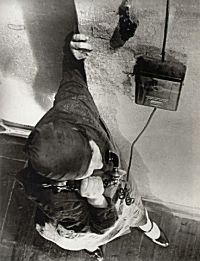

 Janus Head
Janus Head

 The Age of Briggs & Stratton
The Age of Briggs & Stratton


































































